Earth to Ashish
The designer Ashish Gupta treats every season like his last.
TEXT BY CHRIS STEWART
PHOTOGRAPHY AND STYLING BY ASHISH GUPTA
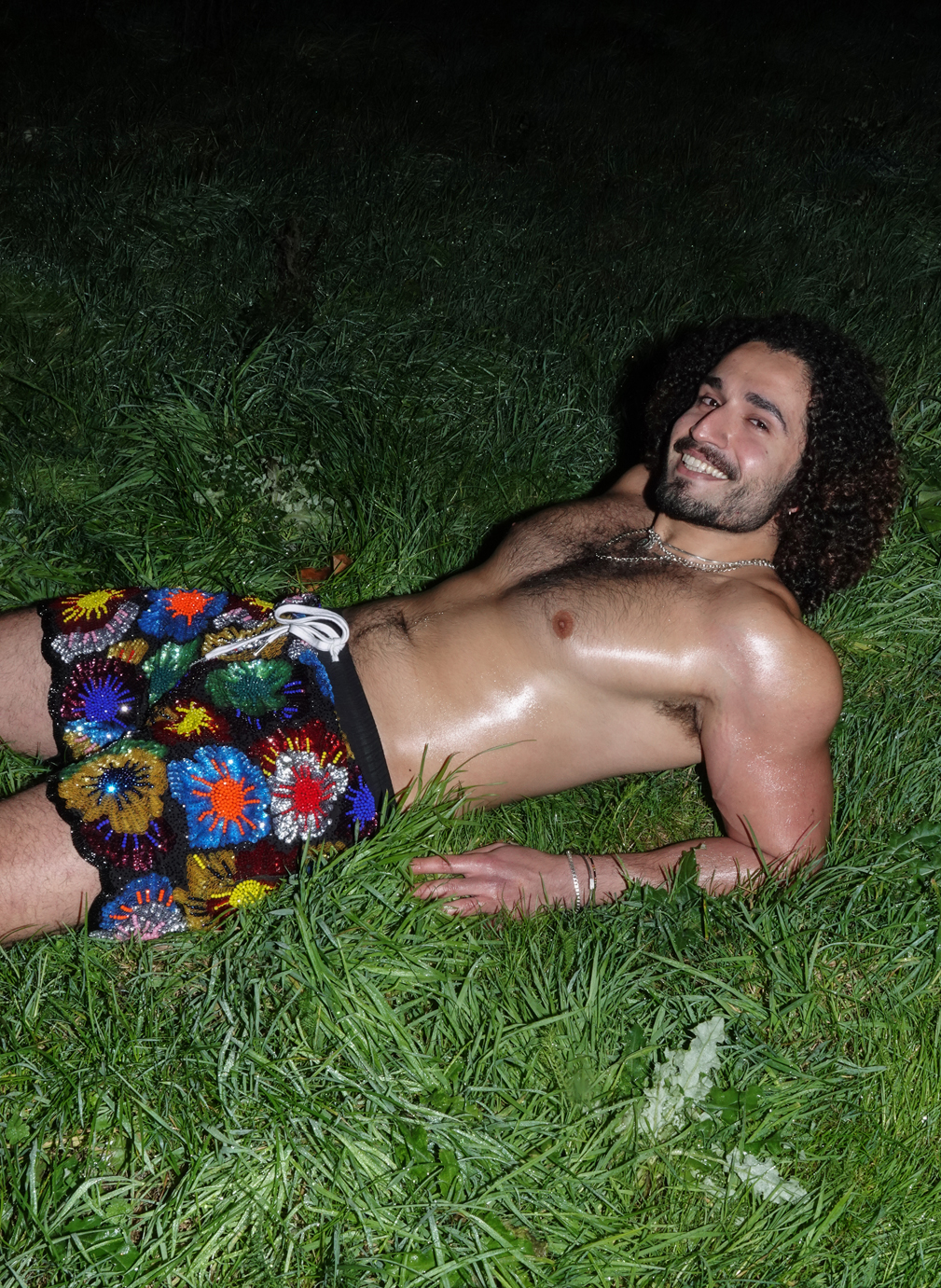
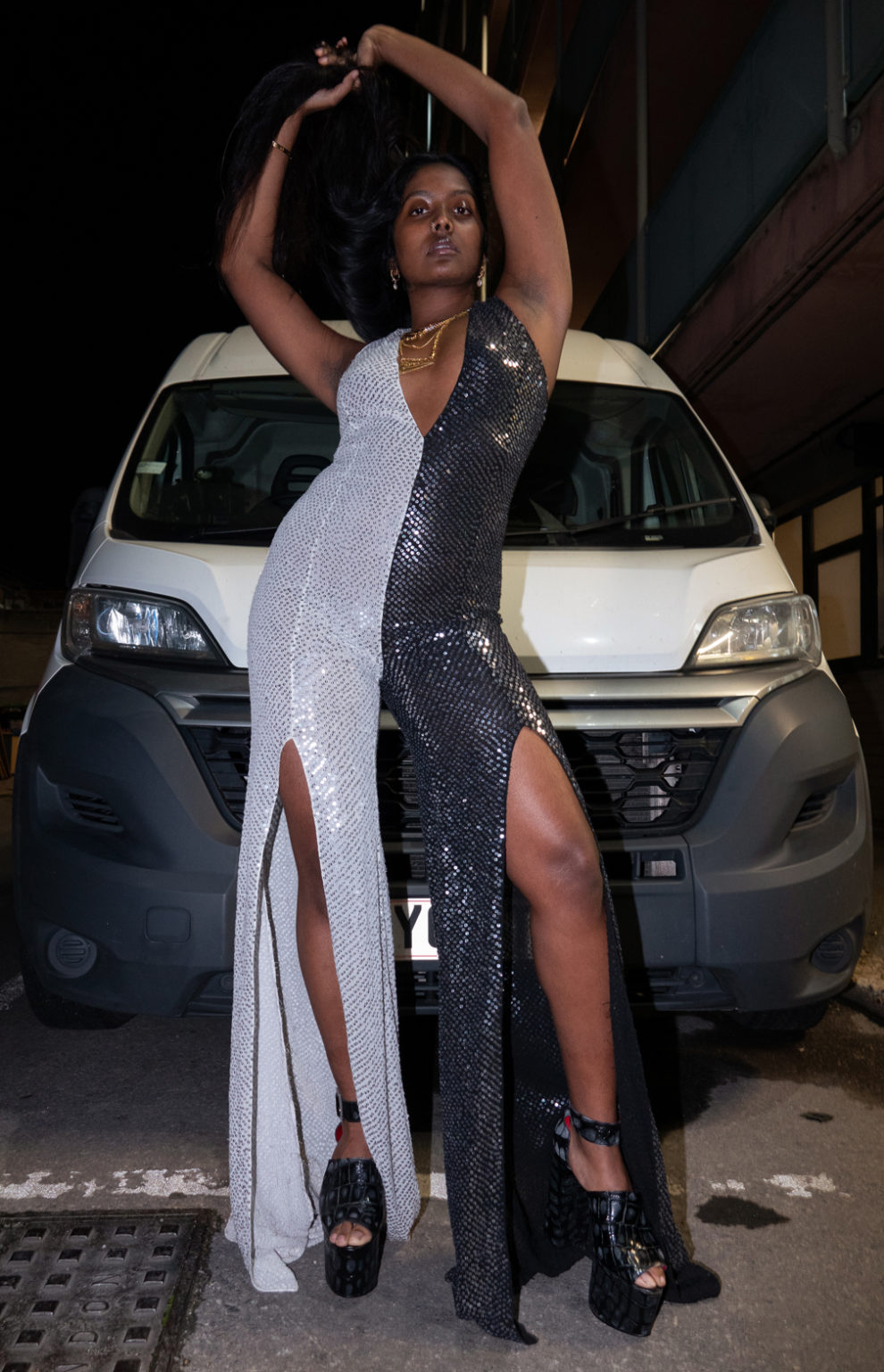
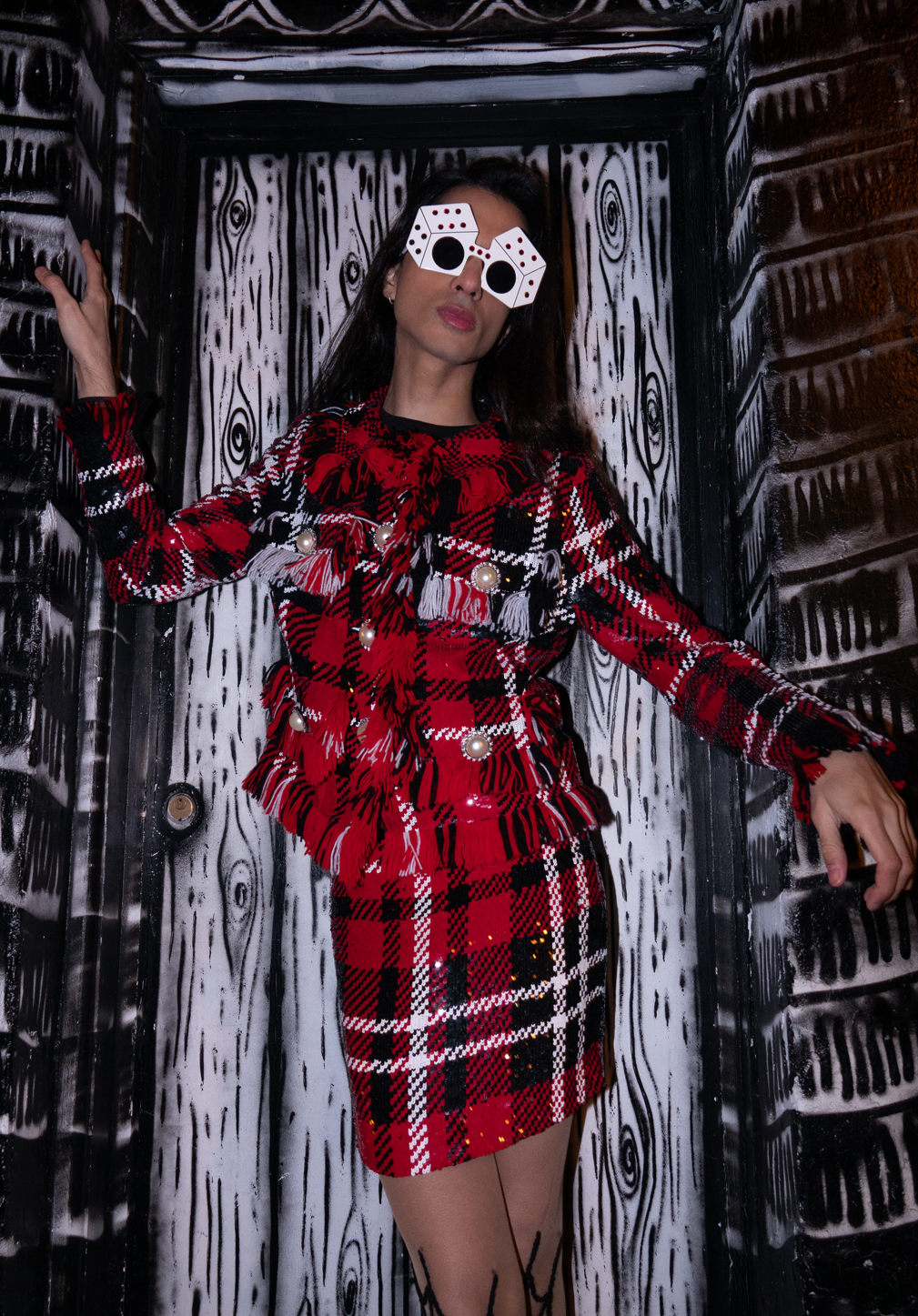
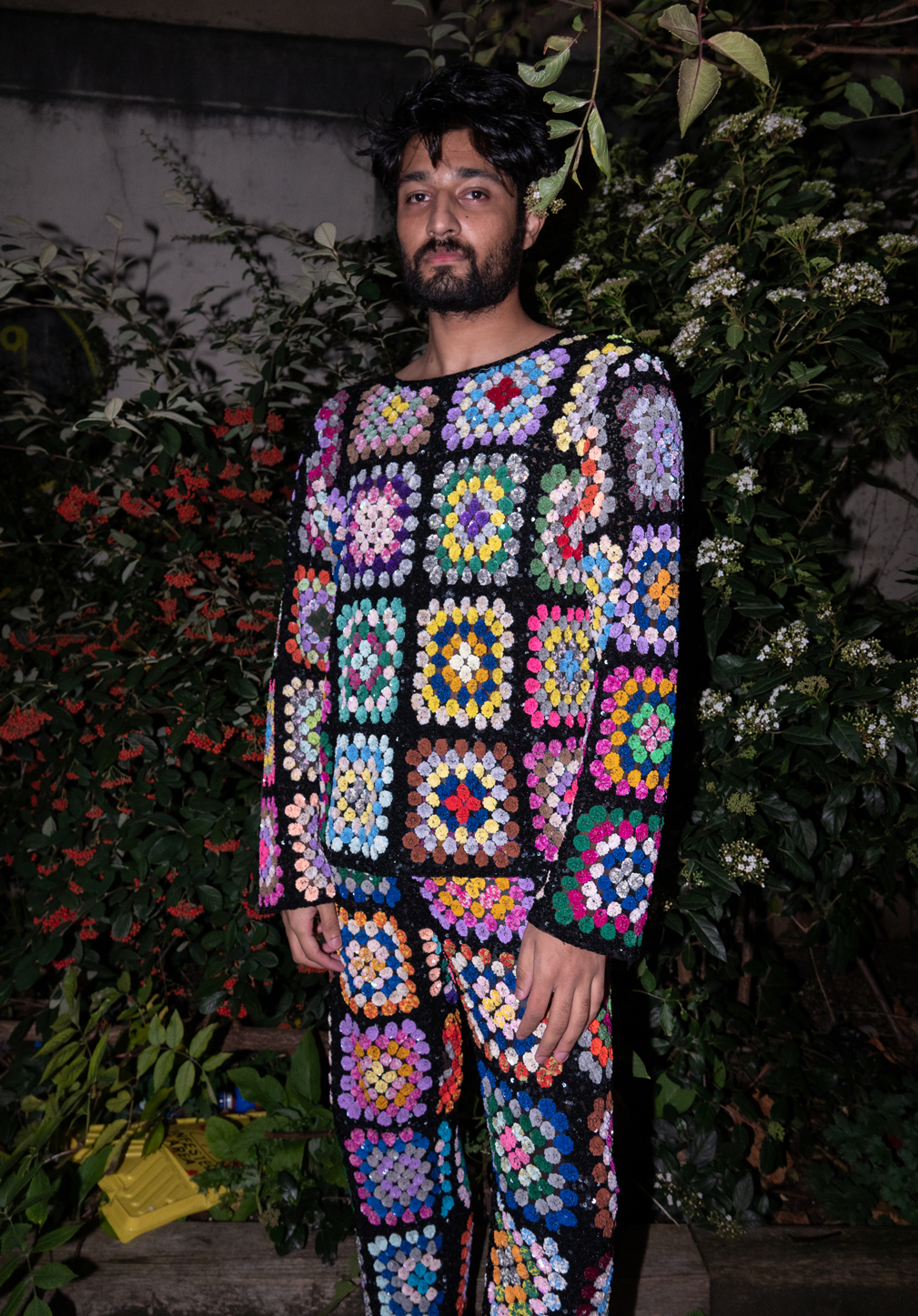
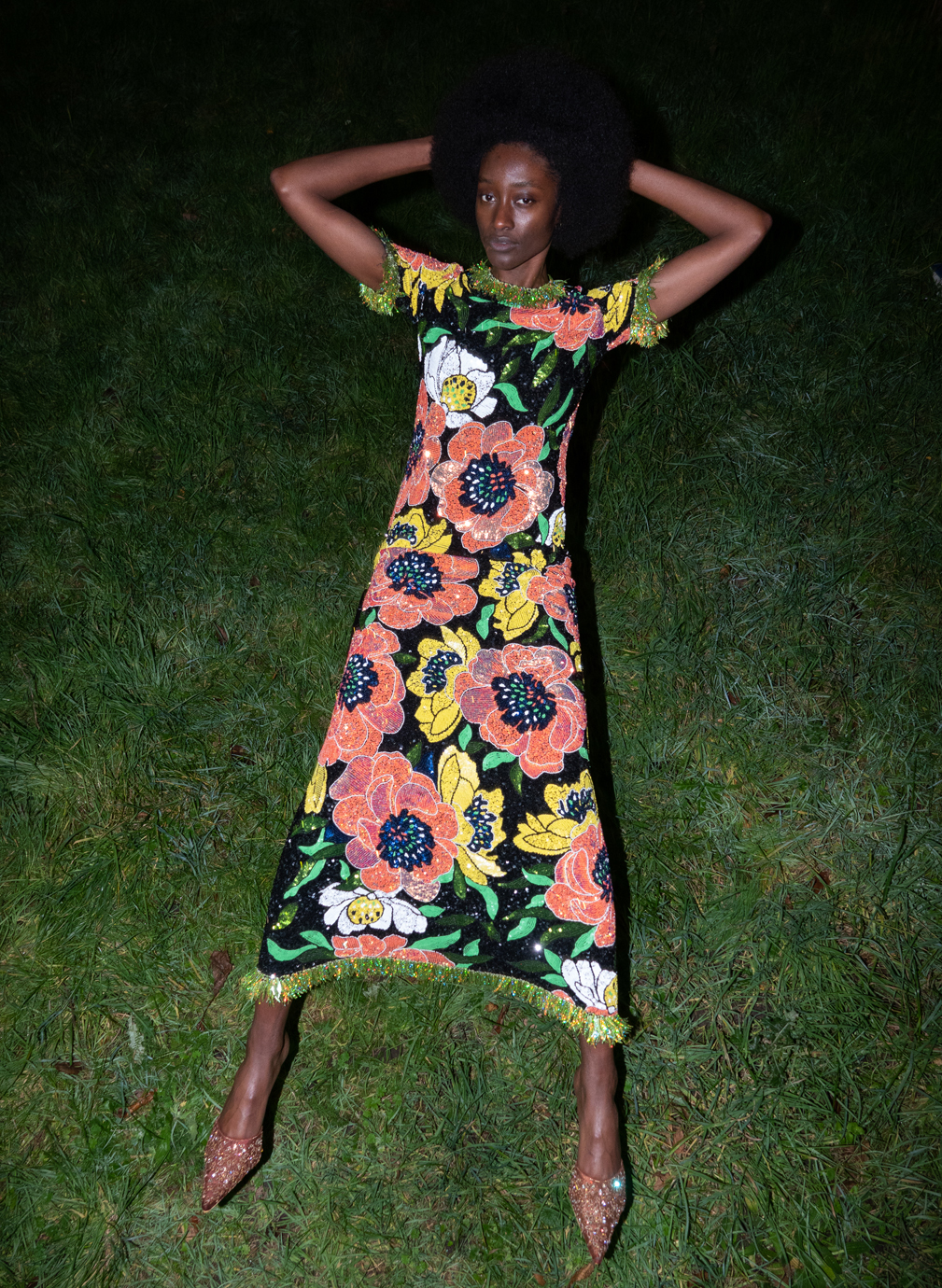
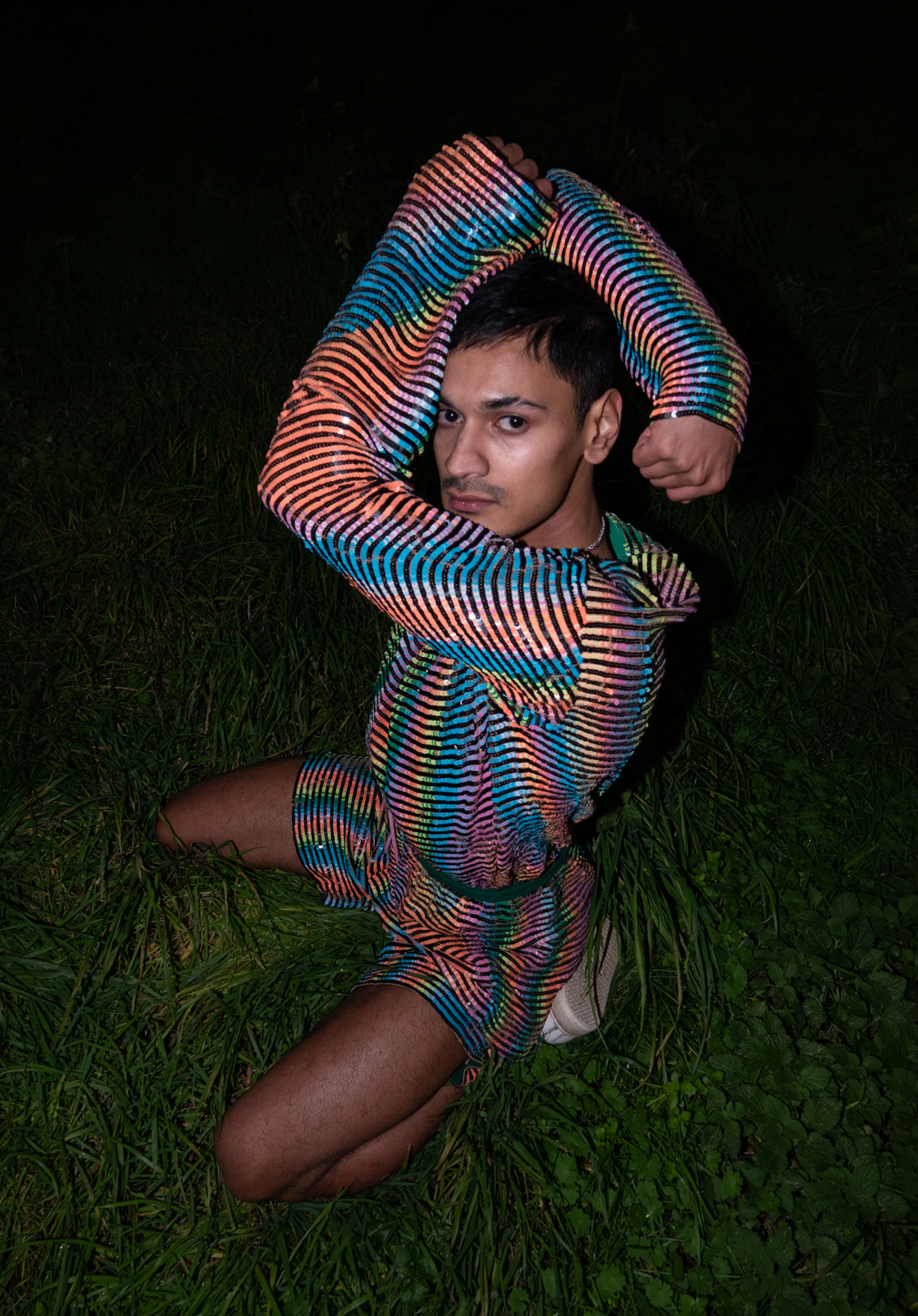
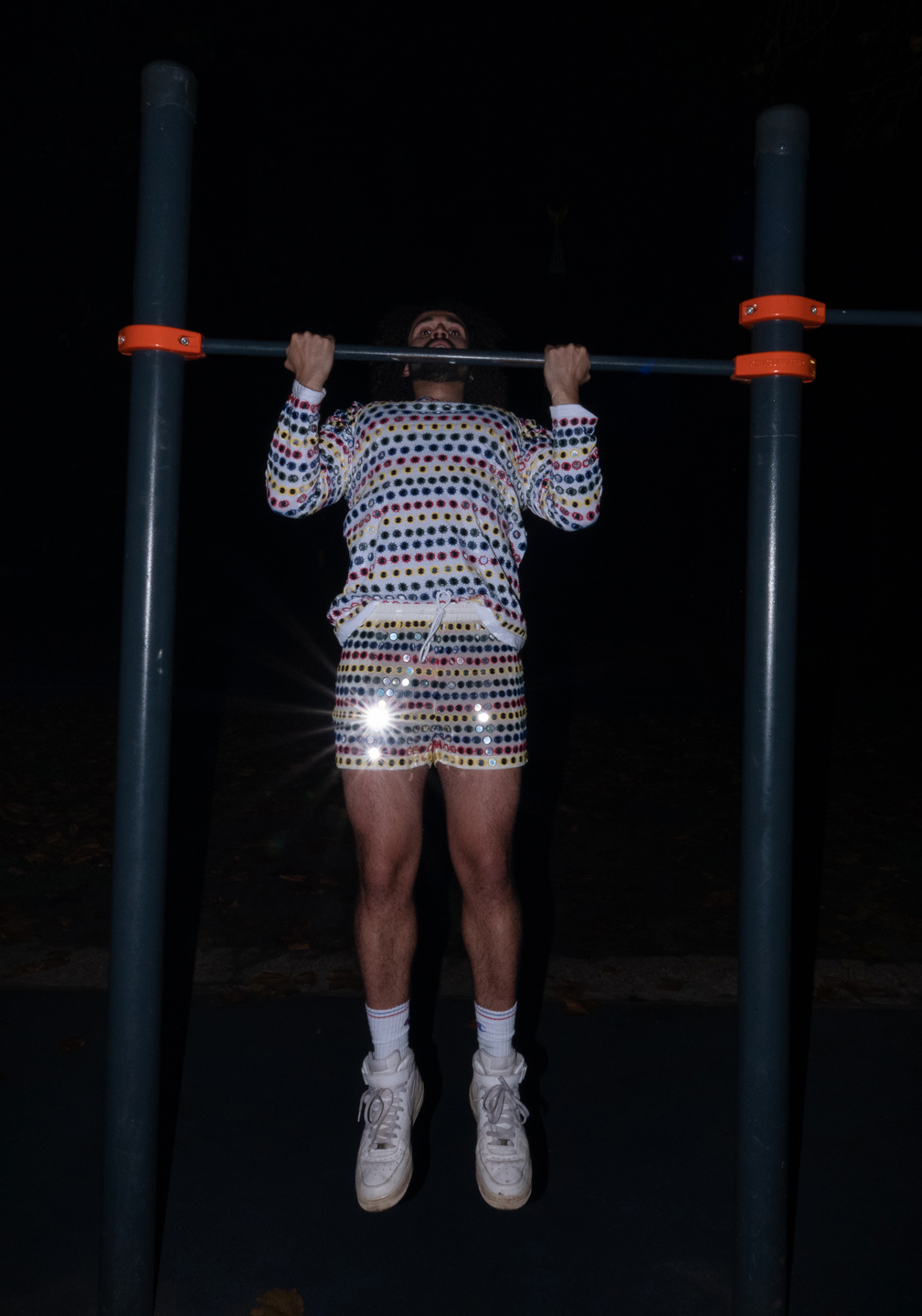
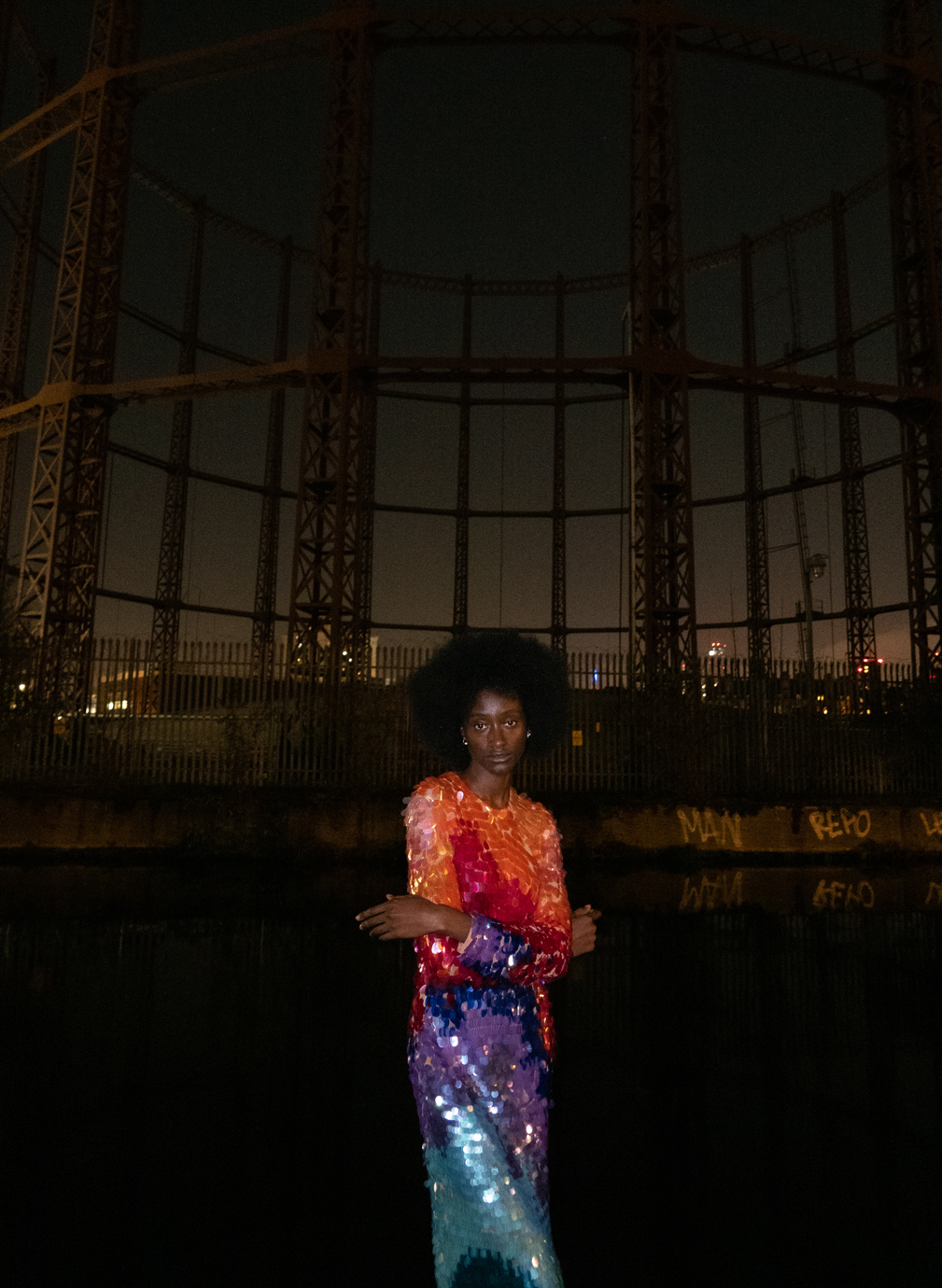
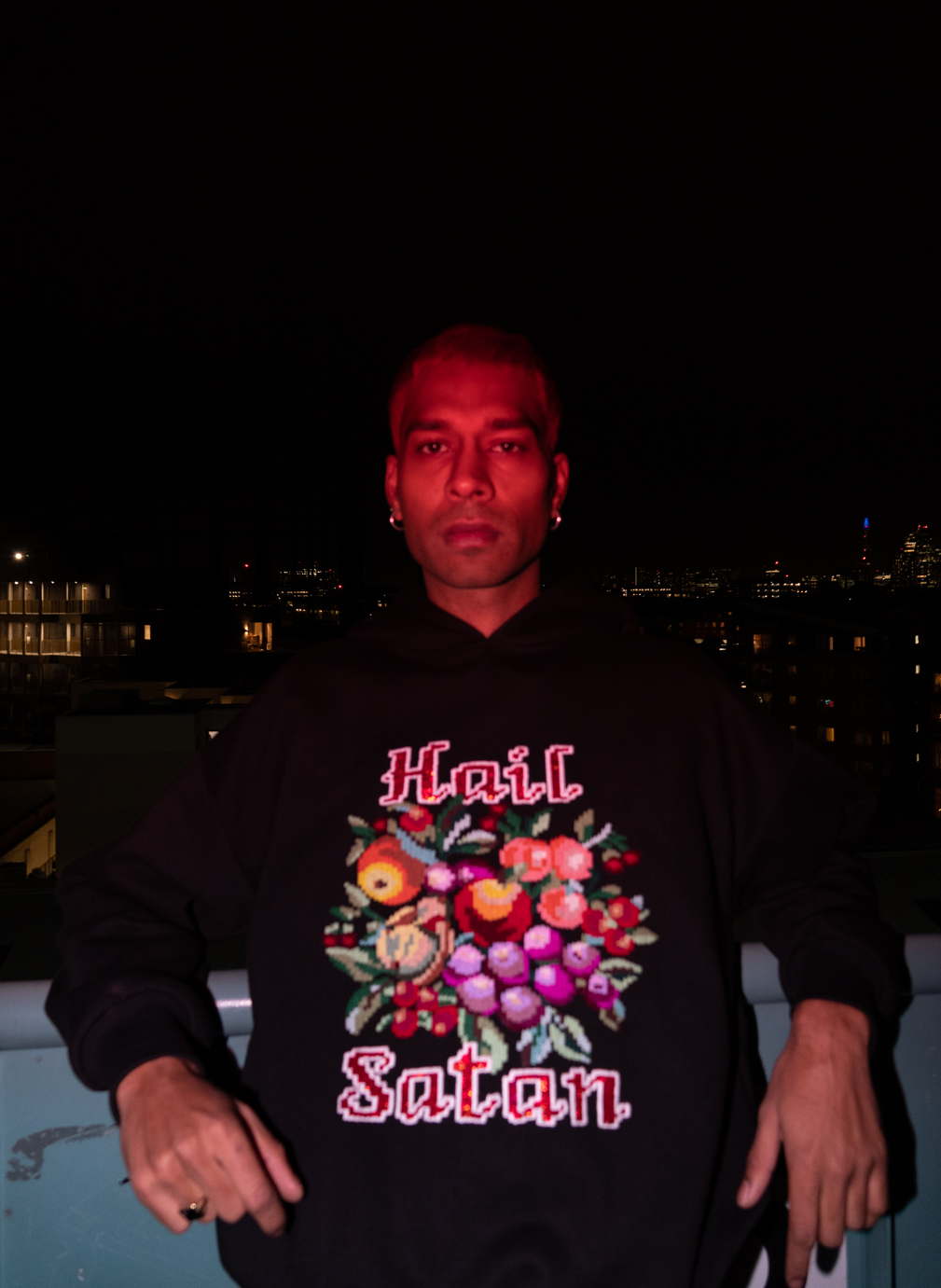
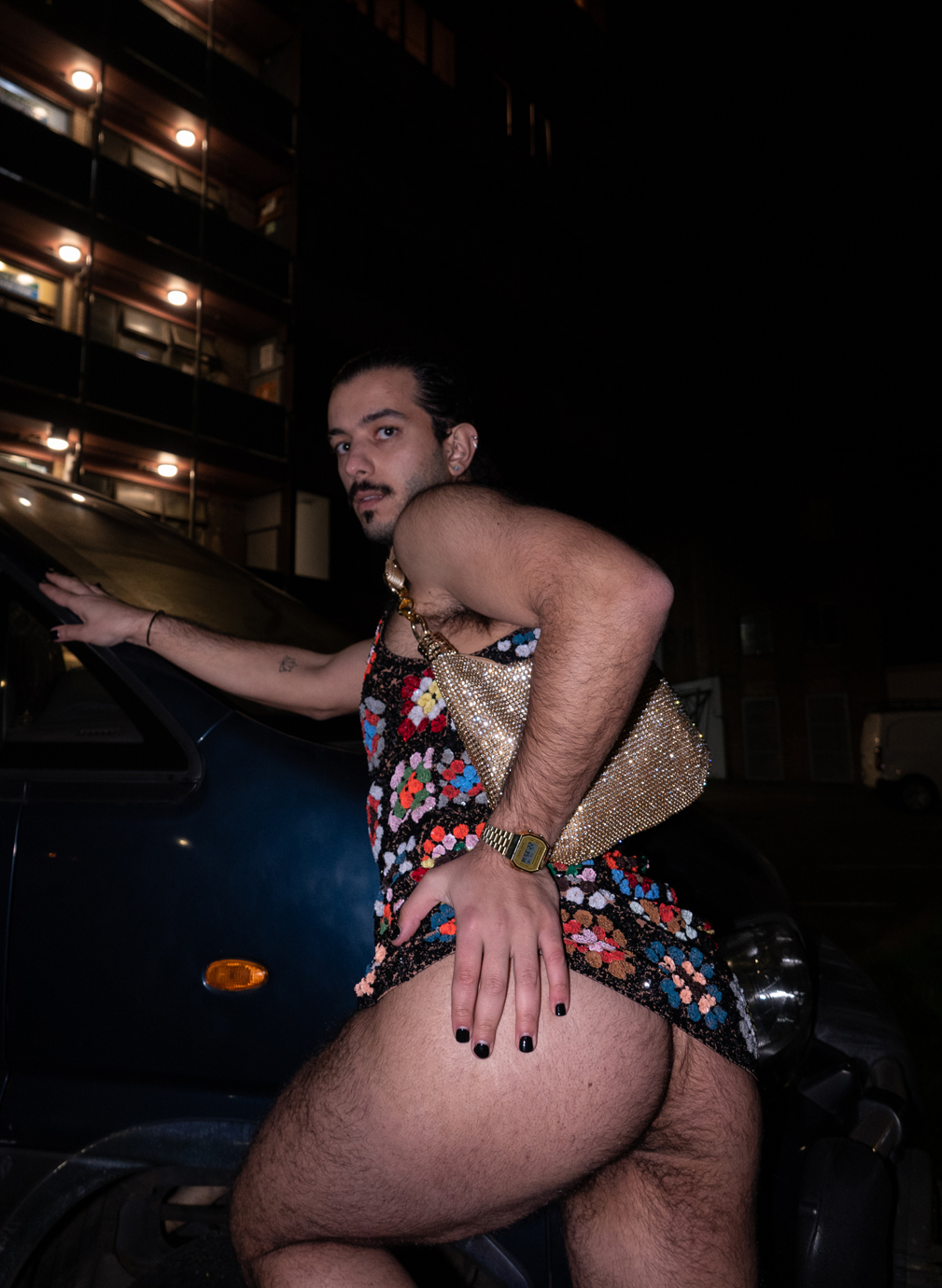
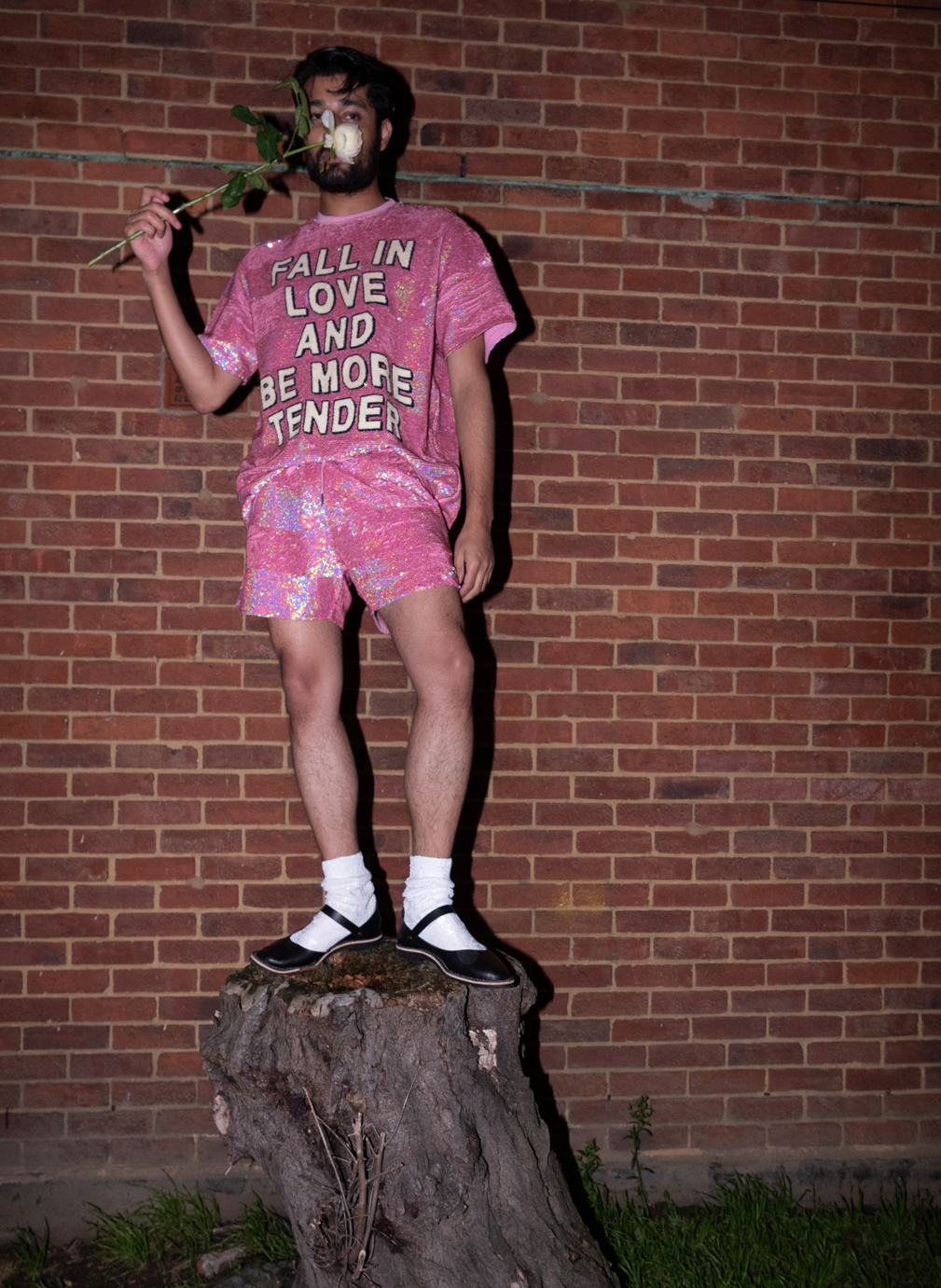
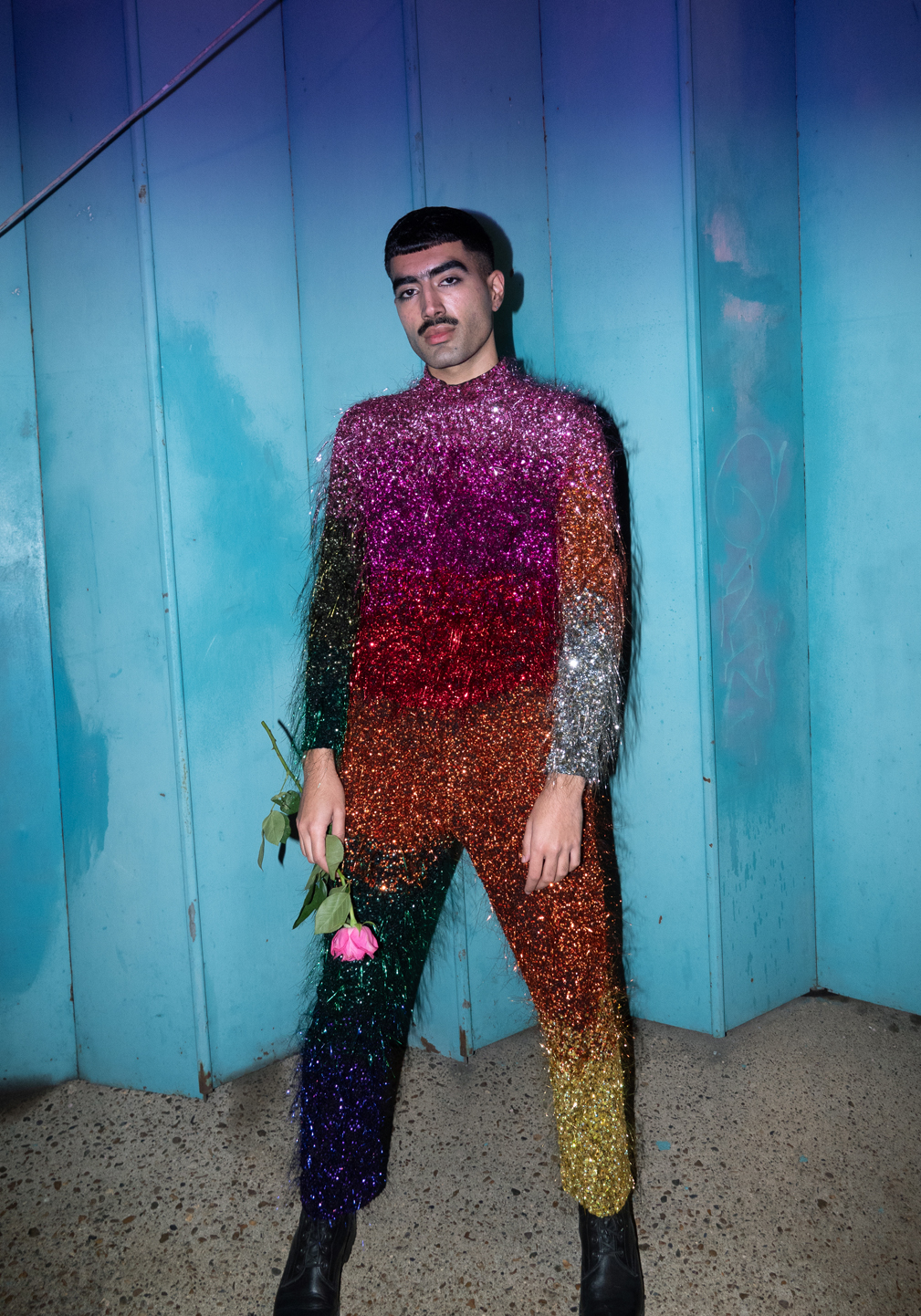
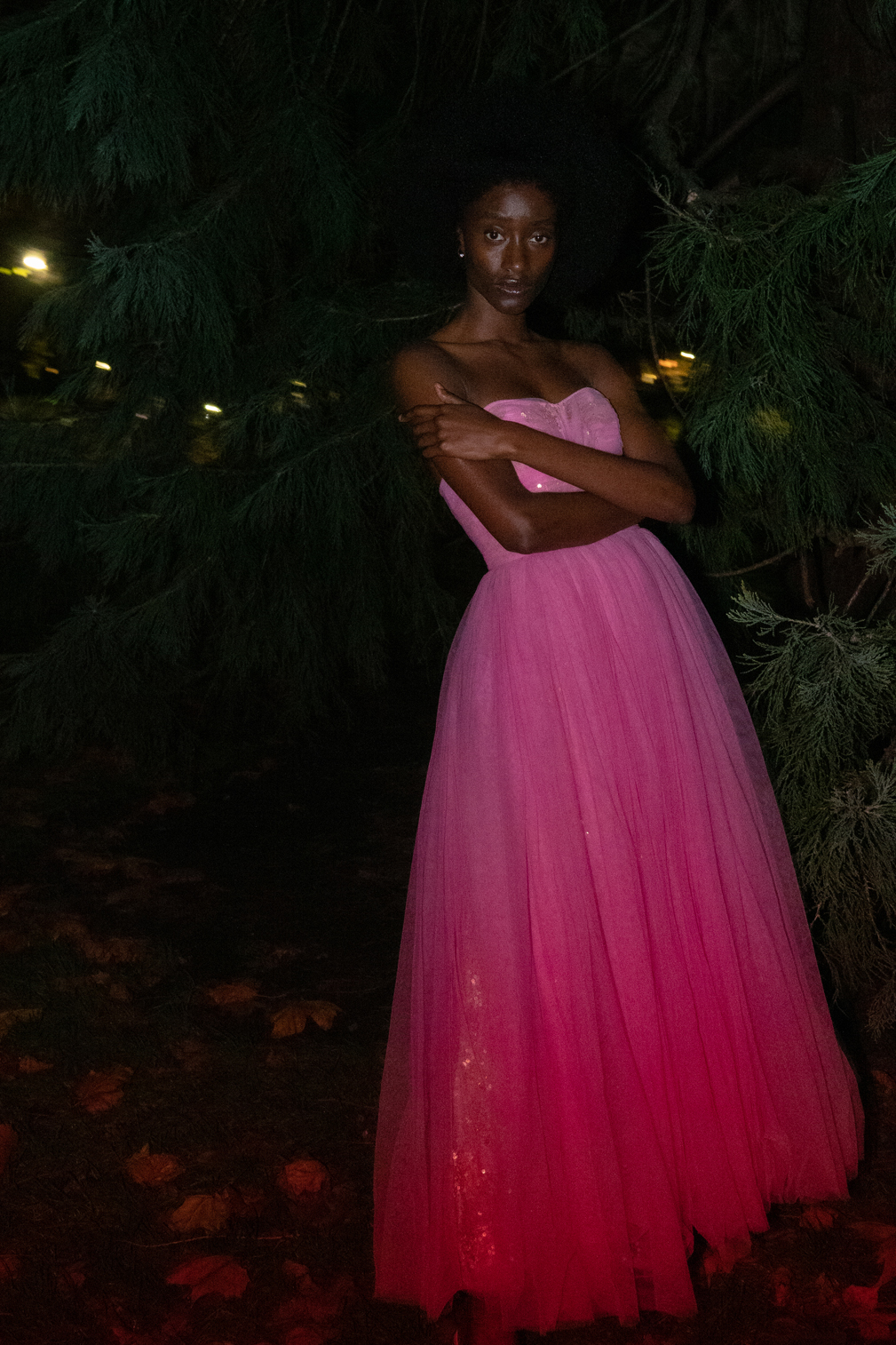
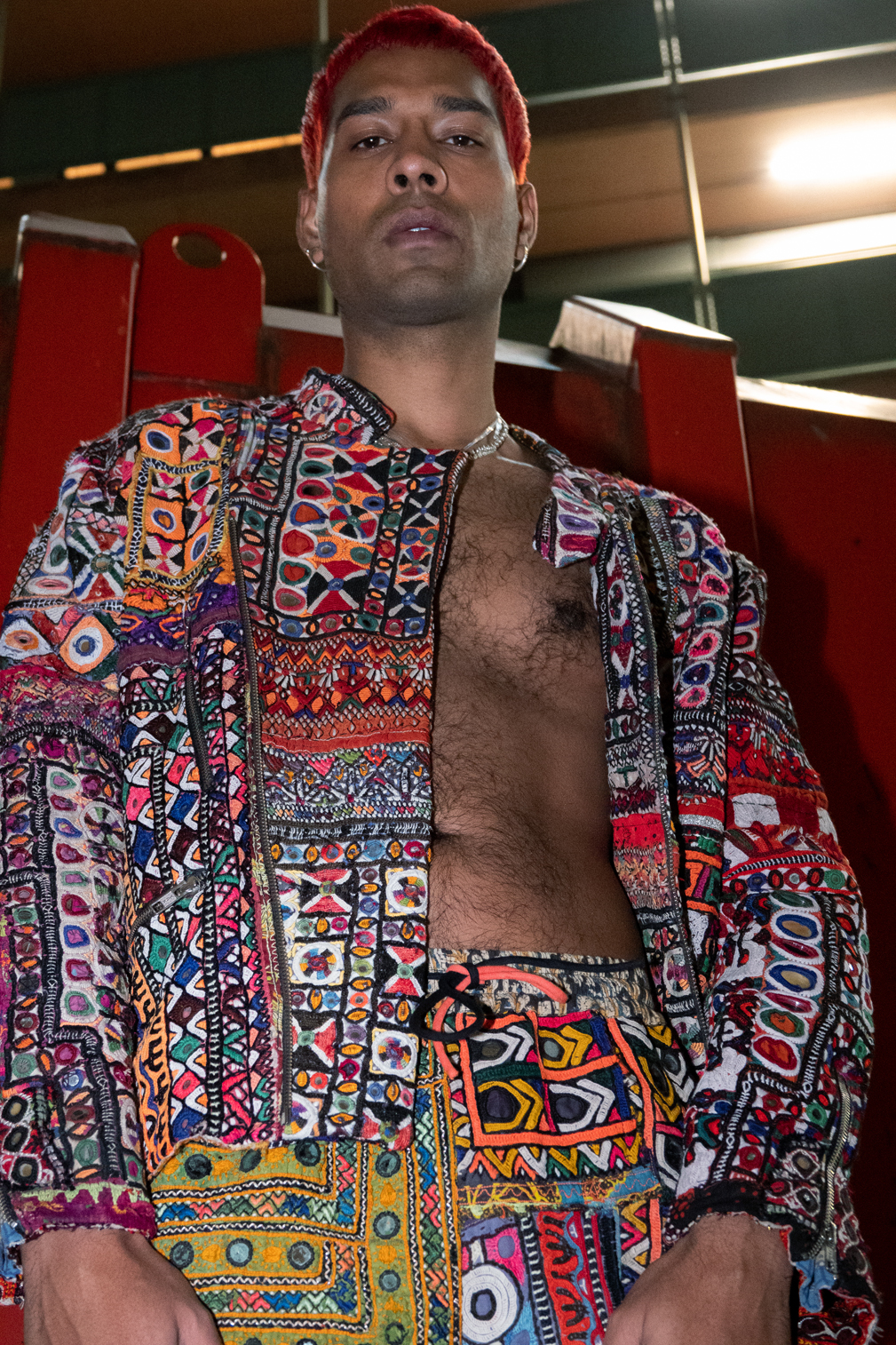
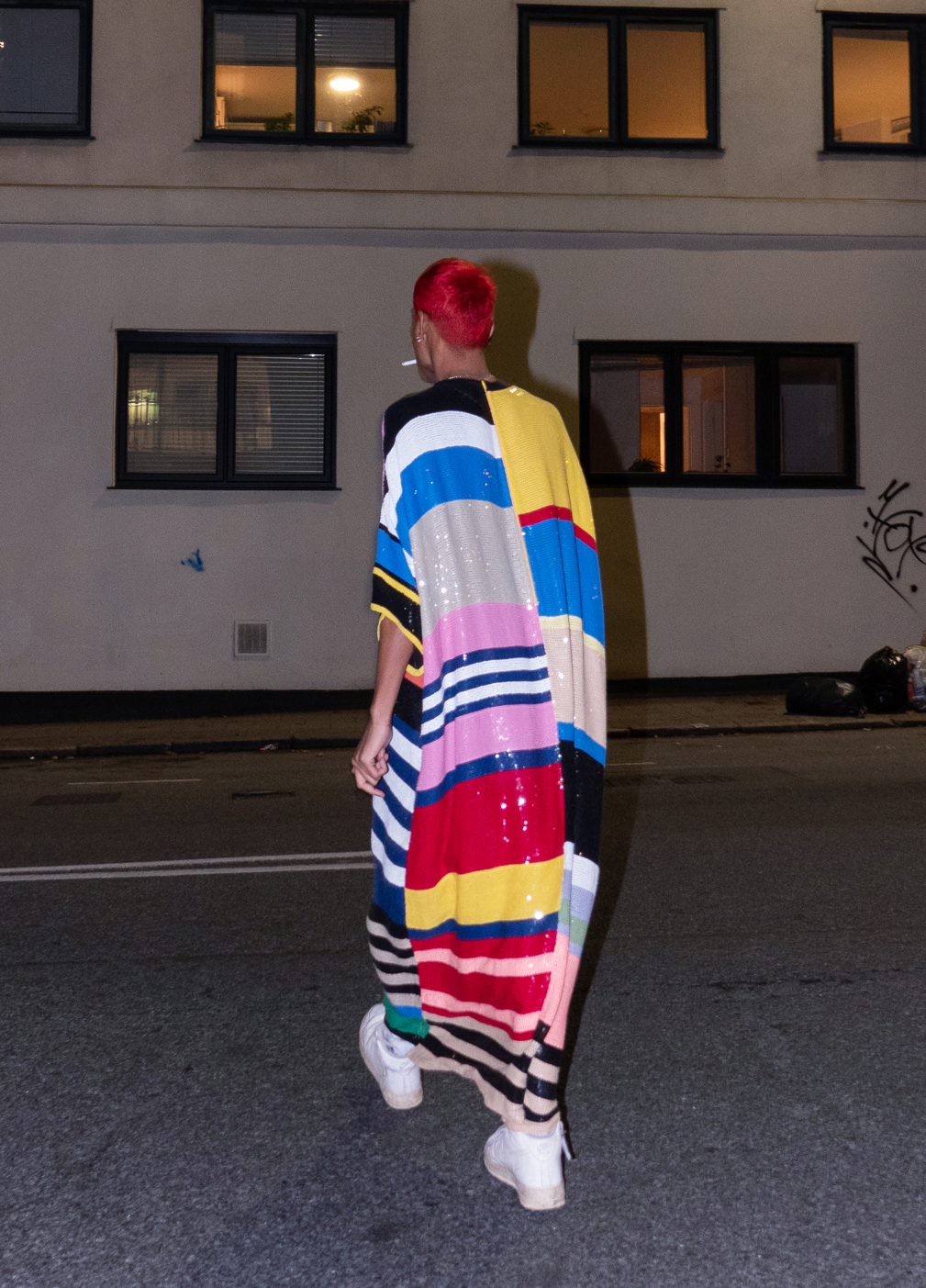
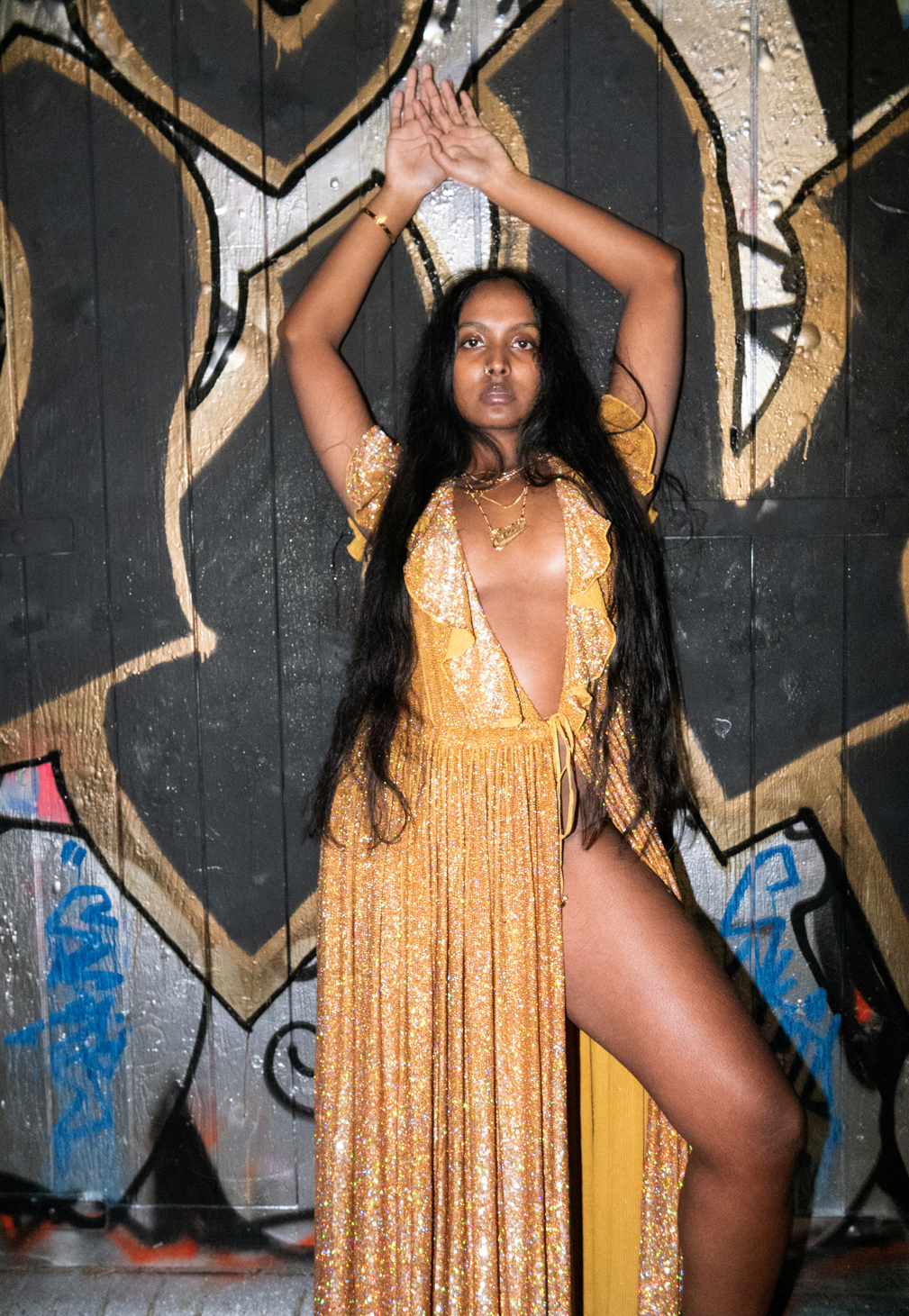
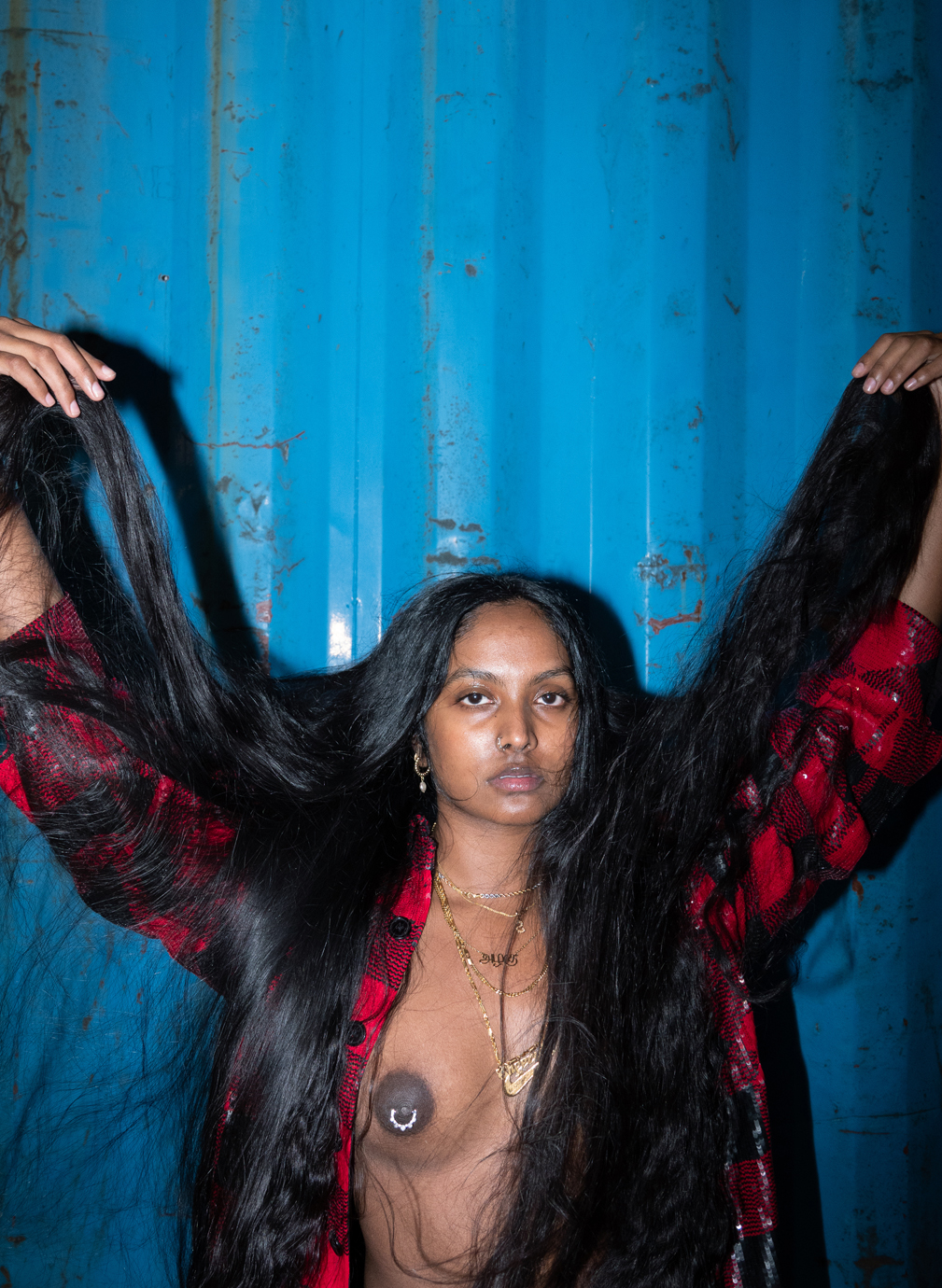
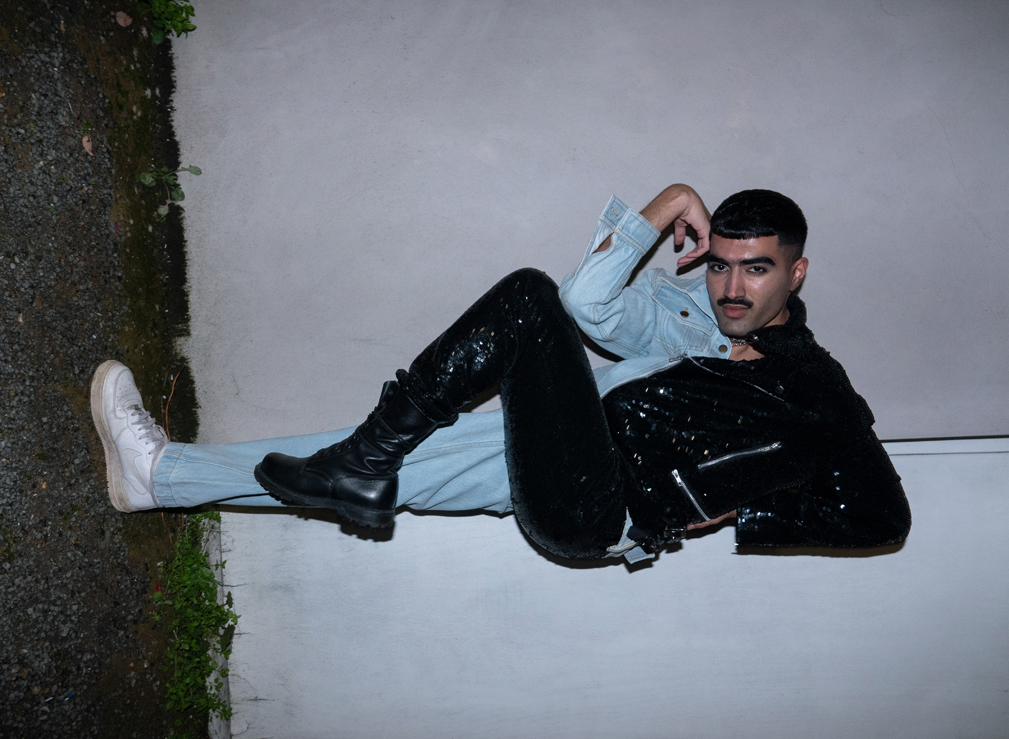
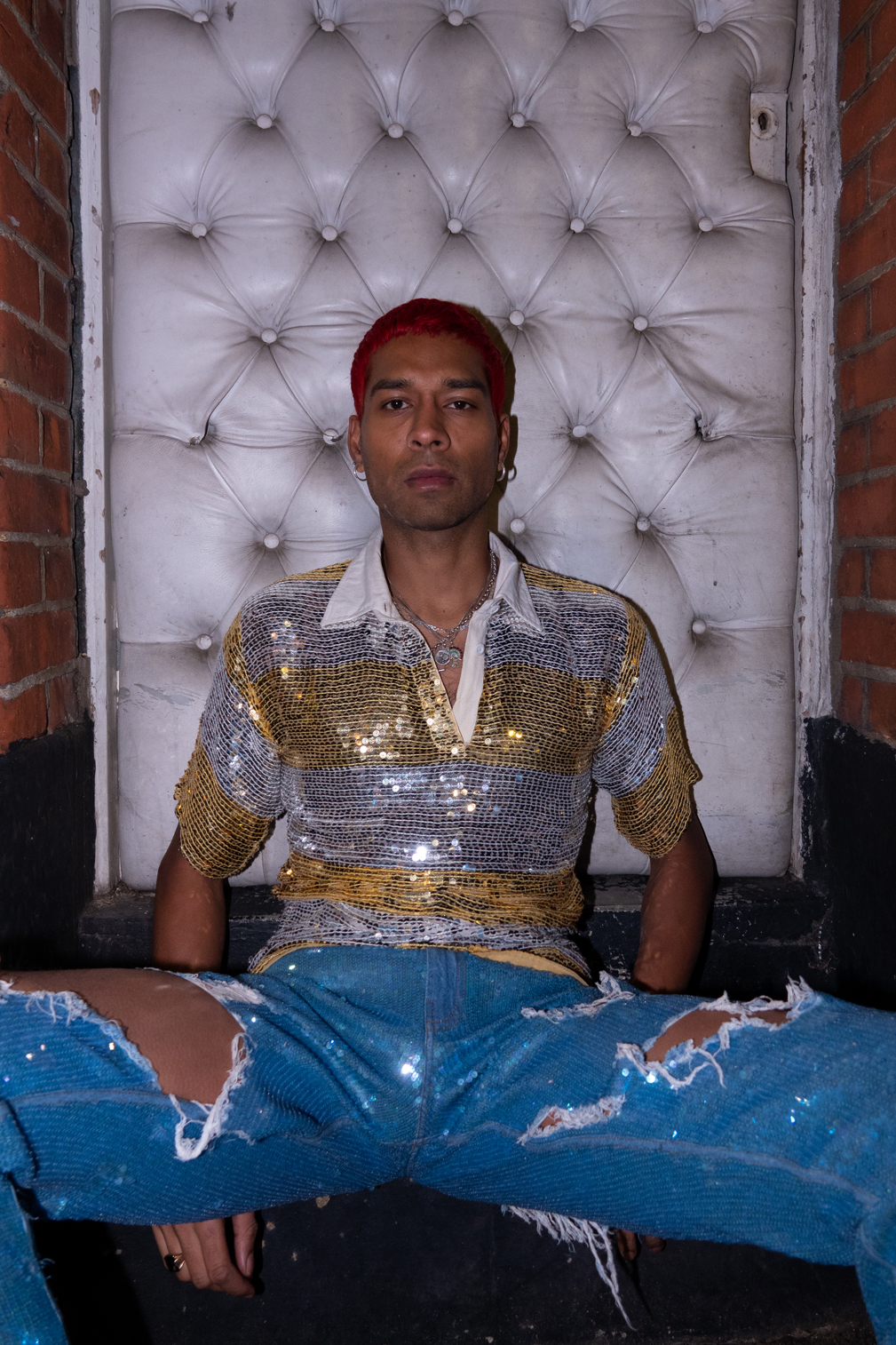
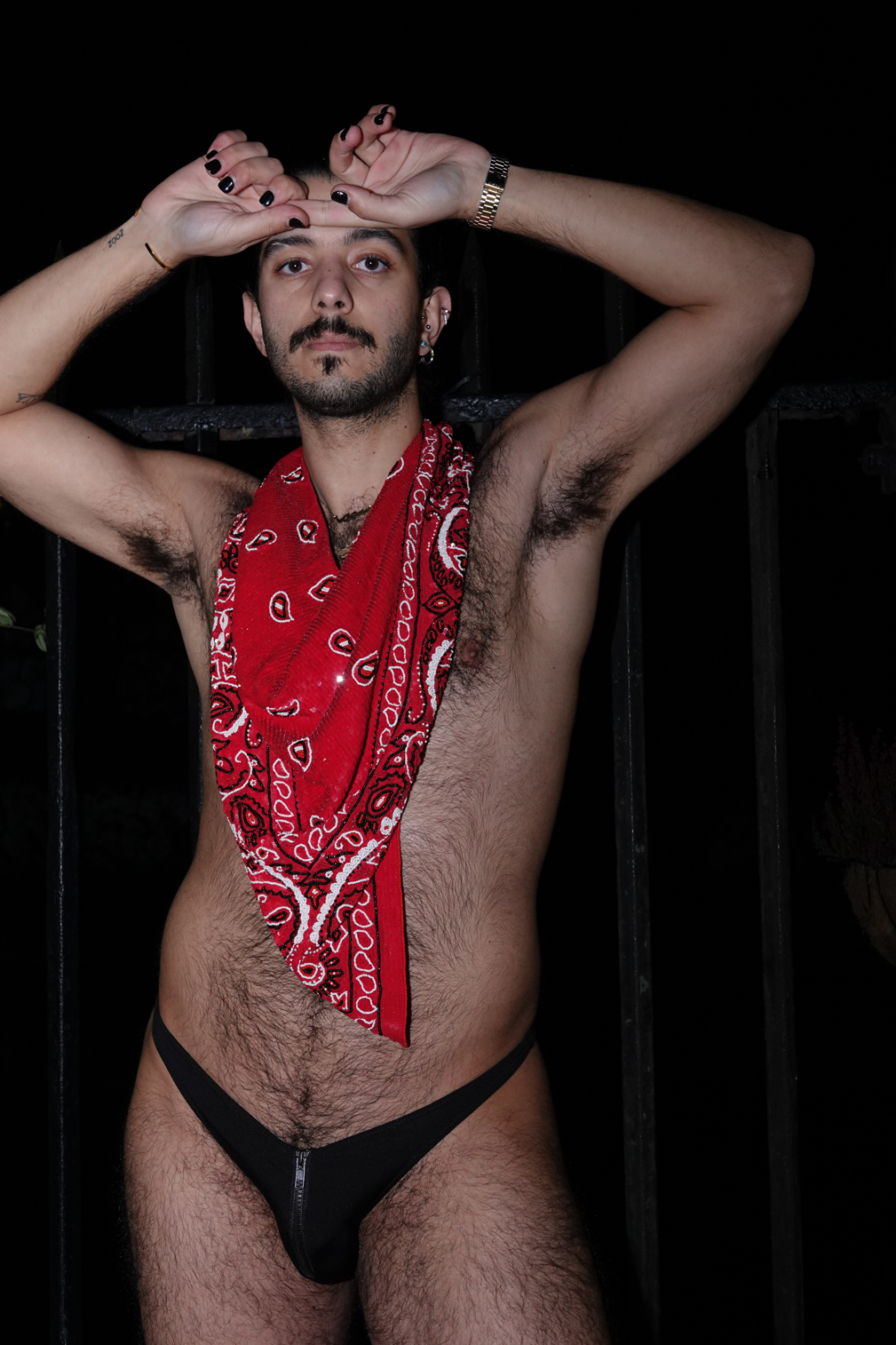

Sahand Nezamabad wears beaded shorts from ASHISH Fall / Winter 2018.
In September 2016, fashion designer Ashish Gupta bowed after presenting his spring/summer collection at London Fashion Week in a T-shirt that said “Immigrant.” Saris, salwars, lungis, and churidars along with embellished, Bollywood-inspired athletic wear had just gone down the runway. It was three months after the Brexit vote, and two months before Donald Trump won the presidency. Delhi-born, London-based Ashish was scared of the anti-immigration policies spreading worldwide, and tired of society thinking it’s enough to be tolerant. “I hate that word tolerate,” he says, video-chatting with me from his studio in London. “You tolerate bad weather. It’s horrible to say you tolerate other people and stuff like immigration.”
Shortly after graduating from Central Saint Martins in 2000, Ashish started his eponymous label. From the beginning, the pieces shimmered with embroidered and sequined detailing. In his collections, rainbows are casual, and the clothes speak for themselves. “I’m Serious,” “All I Want Is Love,” “More Glitter Less Twitter,” and “Queer” have all been emblazoned on sweaters and tees. Fashion, according to Ashish, should always be aspirational, yet his brand aims to reflect its audience very honestly. “It’s like when you get on a train,” he says. “You don’t just see white people. You see lots of different people of different colors and ethnicities and sexual orientations who speak different languages.” Long before fashion began reckoning with its inclusivity problem, Ashish had prioritized models of color and queer people.
A clear vision can be a tough pill to swallow in an industry still primarily run by straight white people. The label has had its ups and downs with buyers and the market, but Ashish always prepared for the worst. “If this is your last season, the last time you could ever do anything creative, what would you do?” He asks himself this question every season. A penchant for endings is a queer survival tactic and always designing for a finale no doubt generates a fearlessness often absent in fashion. “You have to be brave, and you have to believe in what you’re trying to say,” Ashish explains. “Trying to stay strong and trying to find some joy gets you through a lot in life.”
When the pandemic began, Ashish was wrapping up at Paris fashion week. He flew back to London during the lockdown. Facing global travel restrictions, Ashish would be unable to travel back to India to oversee production at the factory he founded. He considers his employees a large extended family, and his mom, a retired doctor, helps him run the business. In another example of his ethical progressivism, while most fashion companies cut spending through layoffs and store closures, Ashish managed to keep all 70 of his employees on the payroll through the pandemic. He admits that was one of his biggest achievements this year.
While trapped at home in London, Ashish became inspired by 1970s Touch ‘n Tuck tapestry patterns. He started sending paint-by- and bead-by-number design briefs to India, seeing a domestic pastime transform into ready-to-wear. Created under unique circumstances, the latest collection followed the rhythm of lockdowns and restrictions in London and India while jumping hurdles to make hand-embroidered wares with an analog digital aesthetic to reflect the process. Again, the clothes speak directly to their moment. One hoodie says, “Fuck 2020” while another proclaims, “Hope Springs Eternal.”
This story was printed in GAYLETTER Issue 13, get a copy here.
Sheerah Ravindren wears a sequin jumpsuit from ASHISH Spring / Summer 2021.
In September 2016, fashion designer Ashish Gupta bowed after presenting his spring/summer collection at London Fashion Week in a T-shirt that said “Immigrant.” Saris, salwars, lungis, and churidars along with embellished, Bollywood-inspired athletic wear had just gone down the runway. It was three months after the Brexit vote, and two months before Donald Trump won the presidency. Delhi-born, London-based Ashish was scared of the anti-immigration policies spreading worldwide, and tired of society thinking it’s enough to be tolerant. “I hate that word tolerate,” he says, video-chatting with me from his studio in London. “You tolerate bad weather. It’s horrible to say you tolerate other people and stuff like immigration.”
Shortly after graduating from Central Saint Martins in 2000, Ashish started his eponymous label. From the beginning, the pieces shimmered with embroidered and sequined detailing. In his collections, rainbows are casual, and the clothes speak for themselves. “I’m Serious,” “All I Want Is Love,” “More Glitter Less Twitter,” and “Queer” have all been emblazoned on sweaters and tees. Fashion, according to Ashish, should always be aspirational, yet his brand aims to reflect its audience very honestly. “It’s like when you get on a train,” he says. “You don’t just see white people. You see lots of different people of different colors and ethnicities and sexual orientations who speak different languages.” Long before fashion began reckoning with its inclusivity problem, Ashish had prioritized models of color and queer people.
A clear vision can be a tough pill to swallow in an industry still primarily run by straight white people. The label has had its ups and downs with buyers and the market, but Ashish always prepared for the worst. “If this is your last season, the last time you could ever do anything creative, what would you do?” He asks himself this question every season. A penchant for endings is a queer survival tactic and always designing for a finale no doubt generates a fearlessness often absent in fashion. “You have to be brave, and you have to believe in what you’re trying to say,” Ashish explains. “Trying to stay strong and trying to find some joy gets you through a lot in life.”
When the pandemic began, Ashish was wrapping up at Paris fashion week. He flew back to London during the lockdown. Facing global travel restrictions, Ashish would be unable to travel back to India to oversee production at the factory he founded. He considers his employees a large extended family, and his mom, a retired doctor, helps him run the business. In another example of his ethical progressivism, while most fashion companies cut spending through layoffs and store closures, Ashish managed to keep all 70 of his employees on the payroll through the pandemic. He admits that was one of his biggest achievements this year.
While trapped at home in London, Ashish became inspired by 1970s Touch ‘n Tuck tapestry patterns. He started sending paint-by- and bead-by-number design briefs to India, seeing a domestic pastime transform into ready-to-wear. Created under unique circumstances, the latest collection followed the rhythm of lockdowns and restrictions in London and India while jumping hurdles to make hand-embroidered wares with an analog digital aesthetic to reflect the process. Again, the clothes speak directly to their moment. One hoodie says, “Fuck 2020” while another proclaims, “Hope Springs Eternal.”
This story was printed in GAYLETTER Issue 13, get a copy here.
Emman De Battista wears a sequin skirt suit from ASHISH Fall / Winter 2011 and sunglasses by Tatty Devine X ASHISH Fall / Winter 2009.
In September 2016, fashion designer Ashish Gupta bowed after presenting his spring/summer collection at London Fashion Week in a T-shirt that said “Immigrant.” Saris, salwars, lungis, and churidars along with embellished, Bollywood-inspired athletic wear had just gone down the runway. It was three months after the Brexit vote, and two months before Donald Trump won the presidency. Delhi-born, London-based Ashish was scared of the anti-immigration policies spreading worldwide, and tired of society thinking it’s enough to be tolerant. “I hate that word tolerate,” he says, video-chatting with me from his studio in London. “You tolerate bad weather. It’s horrible to say you tolerate other people and stuff like immigration.”
Shortly after graduating from Central Saint Martins in 2000, Ashish started his eponymous label. From the beginning, the pieces shimmered with embroidered and sequined detailing. In his collections, rainbows are casual, and the clothes speak for themselves. “I’m Serious,” “All I Want Is Love,” “More Glitter Less Twitter,” and “Queer” have all been emblazoned on sweaters and tees. Fashion, according to Ashish, should always be aspirational, yet his brand aims to reflect its audience very honestly. “It’s like when you get on a train,” he says. “You don’t just see white people. You see lots of different people of different colors and ethnicities and sexual orientations who speak different languages.” Long before fashion began reckoning with its inclusivity problem, Ashish had prioritized models of color and queer people.
A clear vision can be a tough pill to swallow in an industry still primarily run by straight white people. The label has had its ups and downs with buyers and the market, but Ashish always prepared for the worst. “If this is your last season, the last time you could ever do anything creative, what would you do?” He asks himself this question every season. A penchant for endings is a queer survival tactic and always designing for a finale no doubt generates a fearlessness often absent in fashion. “You have to be brave, and you have to believe in what you’re trying to say,” Ashish explains. “Trying to stay strong and trying to find some joy gets you through a lot in life.”
When the pandemic began, Ashish was wrapping up at Paris fashion week. He flew back to London during the lockdown. Facing global travel restrictions, Ashish would be unable to travel back to India to oversee production at the factory he founded. He considers his employees a large extended family, and his mom, a retired doctor, helps him run the business. In another example of his ethical progressivism, while most fashion companies cut spending through layoffs and store closures, Ashish managed to keep all 70 of his employees on the payroll through the pandemic. He admits that was one of his biggest achievements this year.
While trapped at home in London, Ashish became inspired by 1970s Touch ‘n Tuck tapestry patterns. He started sending paint-by- and bead-by-number design briefs to India, seeing a domestic pastime transform into ready-to-wear. Created under unique circumstances, the latest collection followed the rhythm of lockdowns and restrictions in London and India while jumping hurdles to make hand-embroidered wares with an analog digital aesthetic to reflect the process. Again, the clothes speak directly to their moment. One hoodie says, “Fuck 2020” while another proclaims, “Hope Springs Eternal.”
This story was printed in GAYLETTER Issue 13, get a copy here.
Zain Ali wears a sequin top and trousers from ASHISH Fall / Winter 2019.
In September 2016, fashion designer Ashish Gupta bowed after presenting his spring/summer collection at London Fashion Week in a T-shirt that said “Immigrant.” Saris, salwars, lungis, and churidars along with embellished, Bollywood-inspired athletic wear had just gone down the runway. It was three months after the Brexit vote, and two months before Donald Trump won the presidency. Delhi-born, London-based Ashish was scared of the anti-immigration policies spreading worldwide, and tired of society thinking it’s enough to be tolerant. “I hate that word tolerate,” he says, video-chatting with me from his studio in London. “You tolerate bad weather. It’s horrible to say you tolerate other people and stuff like immigration.”
Shortly after graduating from Central Saint Martins in 2000, Ashish started his eponymous label. From the beginning, the pieces shimmered with embroidered and sequined detailing. In his collections, rainbows are casual, and the clothes speak for themselves. “I’m Serious,” “All I Want Is Love,” “More Glitter Less Twitter,” and “Queer” have all been emblazoned on sweaters and tees. Fashion, according to Ashish, should always be aspirational, yet his brand aims to reflect its audience very honestly. “It’s like when you get on a train,” he says. “You don’t just see white people. You see lots of different people of different colors and ethnicities and sexual orientations who speak different languages.” Long before fashion began reckoning with its inclusivity problem, Ashish had prioritized models of color and queer people.
A clear vision can be a tough pill to swallow in an industry still primarily run by straight white people. The label has had its ups and downs with buyers and the market, but Ashish always prepared for the worst. “If this is your last season, the last time you could ever do anything creative, what would you do?” He asks himself this question every season. A penchant for endings is a queer survival tactic and always designing for a finale no doubt generates a fearlessness often absent in fashion. “You have to be brave, and you have to believe in what you’re trying to say,” Ashish explains. “Trying to stay strong and trying to find some joy gets you through a lot in life.”
When the pandemic began, Ashish was wrapping up at Paris fashion week. He flew back to London during the lockdown. Facing global travel restrictions, Ashish would be unable to travel back to India to oversee production at the factory he founded. He considers his employees a large extended family, and his mom, a retired doctor, helps him run the business. In another example of his ethical progressivism, while most fashion companies cut spending through layoffs and store closures, Ashish managed to keep all 70 of his employees on the payroll through the pandemic. He admits that was one of his biggest achievements this year.
While trapped at home in London, Ashish became inspired by 1970s Touch ‘n Tuck tapestry patterns. He started sending paint-by- and bead-by-number design briefs to India, seeing a domestic pastime transform into ready-to-wear. Created under unique circumstances, the latest collection followed the rhythm of lockdowns and restrictions in London and India while jumping hurdles to make hand-embroidered wares with an analog digital aesthetic to reflect the process. Again, the clothes speak directly to their moment. One hoodie says, “Fuck 2020” while another proclaims, “Hope Springs Eternal.”
This story was printed in GAYLETTER Issue 13, get a copy here.
Sienna King wears a beaded evening gown from ASHISH Fall / Winter 2020.
In September 2016, fashion designer Ashish Gupta bowed after presenting his spring/summer collection at London Fashion Week in a T-shirt that said “Immigrant.” Saris, salwars, lungis, and churidars along with embellished, Bollywood-inspired athletic wear had just gone down the runway. It was three months after the Brexit vote, and two months before Donald Trump won the presidency. Delhi-born, London-based Ashish was scared of the anti-immigration policies spreading worldwide, and tired of society thinking it’s enough to be tolerant. “I hate that word tolerate,” he says, video-chatting with me from his studio in London. “You tolerate bad weather. It’s horrible to say you tolerate other people and stuff like immigration.”
Shortly after graduating from Central Saint Martins in 2000, Ashish started his eponymous label. From the beginning, the pieces shimmered with embroidered and sequined detailing. In his collections, rainbows are casual, and the clothes speak for themselves. “I’m Serious,” “All I Want Is Love,” “More Glitter Less Twitter,” and “Queer” have all been emblazoned on sweaters and tees. Fashion, according to Ashish, should always be aspirational, yet his brand aims to reflect its audience very honestly. “It’s like when you get on a train,” he says. “You don’t just see white people. You see lots of different people of different colors and ethnicities and sexual orientations who speak different languages.” Long before fashion began reckoning with its inclusivity problem, Ashish had prioritized models of color and queer people.
A clear vision can be a tough pill to swallow in an industry still primarily run by straight white people. The label has had its ups and downs with buyers and the market, but Ashish always prepared for the worst. “If this is your last season, the last time you could ever do anything creative, what would you do?” He asks himself this question every season. A penchant for endings is a queer survival tactic and always designing for a finale no doubt generates a fearlessness often absent in fashion. “You have to be brave, and you have to believe in what you’re trying to say,” Ashish explains. “Trying to stay strong and trying to find some joy gets you through a lot in life.”
When the pandemic began, Ashish was wrapping up at Paris fashion week. He flew back to London during the lockdown. Facing global travel restrictions, Ashish would be unable to travel back to India to oversee production at the factory he founded. He considers his employees a large extended family, and his mom, a retired doctor, helps him run the business. In another example of his ethical progressivism, while most fashion companies cut spending through layoffs and store closures, Ashish managed to keep all 70 of his employees on the payroll through the pandemic. He admits that was one of his biggest achievements this year.
While trapped at home in London, Ashish became inspired by 1970s Touch ‘n Tuck tapestry patterns. He started sending paint-by- and bead-by-number design briefs to India, seeing a domestic pastime transform into ready-to-wear. Created under unique circumstances, the latest collection followed the rhythm of lockdowns and restrictions in London and India while jumping hurdles to make hand-embroidered wares with an analog digital aesthetic to reflect the process. Again, the clothes speak directly to their moment. One hoodie says, “Fuck 2020” while another proclaims, “Hope Springs Eternal.”
This story was printed in GAYLETTER Issue 13, get a copy here.
Sadek Ahmed wears top and shorts from ASHISH Spring / Summer 2021.
In September 2016, fashion designer Ashish Gupta bowed after presenting his spring/summer collection at London Fashion Week in a T-shirt that said “Immigrant.” Saris, salwars, lungis, and churidars along with embellished, Bollywood-inspired athletic wear had just gone down the runway. It was three months after the Brexit vote, and two months before Donald Trump won the presidency. Delhi-born, London-based Ashish was scared of the anti-immigration policies spreading worldwide, and tired of society thinking it’s enough to be tolerant. “I hate that word tolerate,” he says, video-chatting with me from his studio in London. “You tolerate bad weather. It’s horrible to say you tolerate other people and stuff like immigration.”
Shortly after graduating from Central Saint Martins in 2000, Ashish started his eponymous label. From the beginning, the pieces shimmered with embroidered and sequined detailing. In his collections, rainbows are casual, and the clothes speak for themselves. “I’m Serious,” “All I Want Is Love,” “More Glitter Less Twitter,” and “Queer” have all been emblazoned on sweaters and tees. Fashion, according to Ashish, should always be aspirational, yet his brand aims to reflect its audience very honestly. “It’s like when you get on a train,” he says. “You don’t just see white people. You see lots of different people of different colors and ethnicities and sexual orientations who speak different languages.” Long before fashion began reckoning with its inclusivity problem, Ashish had prioritized models of color and queer people.
A clear vision can be a tough pill to swallow in an industry still primarily run by straight white people. The label has had its ups and downs with buyers and the market, but Ashish always prepared for the worst. “If this is your last season, the last time you could ever do anything creative, what would you do?” He asks himself this question every season. A penchant for endings is a queer survival tactic and always designing for a finale no doubt generates a fearlessness often absent in fashion. “You have to be brave, and you have to believe in what you’re trying to say,” Ashish explains. “Trying to stay strong and trying to find some joy gets you through a lot in life.”
When the pandemic began, Ashish was wrapping up at Paris fashion week. He flew back to London during the lockdown. Facing global travel restrictions, Ashish would be unable to travel back to India to oversee production at the factory he founded. He considers his employees a large extended family, and his mom, a retired doctor, helps him run the business. In another example of his ethical progressivism, while most fashion companies cut spending through layoffs and store closures, Ashish managed to keep all 70 of his employees on the payroll through the pandemic. He admits that was one of his biggest achievements this year.
While trapped at home in London, Ashish became inspired by 1970s Touch ‘n Tuck tapestry patterns. He started sending paint-by- and bead-by-number design briefs to India, seeing a domestic pastime transform into ready-to-wear. Created under unique circumstances, the latest collection followed the rhythm of lockdowns and restrictions in London and India while jumping hurdles to make hand-embroidered wares with an analog digital aesthetic to reflect the process. Again, the clothes speak directly to their moment. One hoodie says, “Fuck 2020” while another proclaims, “Hope Springs Eternal.”
This story was printed in GAYLETTER Issue 13, get a copy here.
Sahand Nezamabad wears mirrorwork embroidered top and shorts from ASHISH Spring / Summer 2020.
In September 2016, fashion designer Ashish Gupta bowed after presenting his spring/summer collection at London Fashion Week in a T-shirt that said “Immigrant.” Saris, salwars, lungis, and churidars along with embellished, Bollywood-inspired athletic wear had just gone down the runway. It was three months after the Brexit vote, and two months before Donald Trump won the presidency. Delhi-born, London-based Ashish was scared of the anti-immigration policies spreading worldwide, and tired of society thinking it’s enough to be tolerant. “I hate that word tolerate,” he says, video-chatting with me from his studio in London. “You tolerate bad weather. It’s horrible to say you tolerate other people and stuff like immigration.”
Shortly after graduating from Central Saint Martins in 2000, Ashish started his eponymous label. From the beginning, the pieces shimmered with embroidered and sequined detailing. In his collections, rainbows are casual, and the clothes speak for themselves. “I’m Serious,” “All I Want Is Love,” “More Glitter Less Twitter,” and “Queer” have all been emblazoned on sweaters and tees. Fashion, according to Ashish, should always be aspirational, yet his brand aims to reflect its audience very honestly. “It’s like when you get on a train,” he says. “You don’t just see white people. You see lots of different people of different colors and ethnicities and sexual orientations who speak different languages.” Long before fashion began reckoning with its inclusivity problem, Ashish had prioritized models of color and queer people.
A clear vision can be a tough pill to swallow in an industry still primarily run by straight white people. The label has had its ups and downs with buyers and the market, but Ashish always prepared for the worst. “If this is your last season, the last time you could ever do anything creative, what would you do?” He asks himself this question every season. A penchant for endings is a queer survival tactic and always designing for a finale no doubt generates a fearlessness often absent in fashion. “You have to be brave, and you have to believe in what you’re trying to say,” Ashish explains. “Trying to stay strong and trying to find some joy gets you through a lot in life.”
When the pandemic began, Ashish was wrapping up at Paris fashion week. He flew back to London during the lockdown. Facing global travel restrictions, Ashish would be unable to travel back to India to oversee production at the factory he founded. He considers his employees a large extended family, and his mom, a retired doctor, helps him run the business. In another example of his ethical progressivism, while most fashion companies cut spending through layoffs and store closures, Ashish managed to keep all 70 of his employees on the payroll through the pandemic. He admits that was one of his biggest achievements this year.
While trapped at home in London, Ashish became inspired by 1970s Touch ‘n Tuck tapestry patterns. He started sending paint-by- and bead-by-number design briefs to India, seeing a domestic pastime transform into ready-to-wear. Created under unique circumstances, the latest collection followed the rhythm of lockdowns and restrictions in London and India while jumping hurdles to make hand-embroidered wares with an analog digital aesthetic to reflect the process. Again, the clothes speak directly to their moment. One hoodie says, “Fuck 2020” while another proclaims, “Hope Springs Eternal.”
This story was printed in GAYLETTER Issue 13, get a copy here.
Sienna King wears a sequin dress from ASHISH Fall / Winter 2020.
In September 2016, fashion designer Ashish Gupta bowed after presenting his spring/summer collection at London Fashion Week in a T-shirt that said “Immigrant.” Saris, salwars, lungis, and churidars along with embellished, Bollywood-inspired athletic wear had just gone down the runway. It was three months after the Brexit vote, and two months before Donald Trump won the presidency. Delhi-born, London-based Ashish was scared of the anti-immigration policies spreading worldwide, and tired of society thinking it’s enough to be tolerant. “I hate that word tolerate,” he says, video-chatting with me from his studio in London. “You tolerate bad weather. It’s horrible to say you tolerate other people and stuff like immigration.”
Shortly after graduating from Central Saint Martins in 2000, Ashish started his eponymous label. From the beginning, the pieces shimmered with embroidered and sequined detailing. In his collections, rainbows are casual, and the clothes speak for themselves. “I’m Serious,” “All I Want Is Love,” “More Glitter Less Twitter,” and “Queer” have all been emblazoned on sweaters and tees. Fashion, according to Ashish, should always be aspirational, yet his brand aims to reflect its audience very honestly. “It’s like when you get on a train,” he says. “You don’t just see white people. You see lots of different people of different colors and ethnicities and sexual orientations who speak different languages.” Long before fashion began reckoning with its inclusivity problem, Ashish had prioritized models of color and queer people.
A clear vision can be a tough pill to swallow in an industry still primarily run by straight white people. The label has had its ups and downs with buyers and the market, but Ashish always prepared for the worst. “If this is your last season, the last time you could ever do anything creative, what would you do?” He asks himself this question every season. A penchant for endings is a queer survival tactic and always designing for a finale no doubt generates a fearlessness often absent in fashion. “You have to be brave, and you have to believe in what you’re trying to say,” Ashish explains. “Trying to stay strong and trying to find some joy gets you through a lot in life.”
When the pandemic began, Ashish was wrapping up at Paris fashion week. He flew back to London during the lockdown. Facing global travel restrictions, Ashish would be unable to travel back to India to oversee production at the factory he founded. He considers his employees a large extended family, and his mom, a retired doctor, helps him run the business. In another example of his ethical progressivism, while most fashion companies cut spending through layoffs and store closures, Ashish managed to keep all 70 of his employees on the payroll through the pandemic. He admits that was one of his biggest achievements this year.
While trapped at home in London, Ashish became inspired by 1970s Touch ‘n Tuck tapestry patterns. He started sending paint-by- and bead-by-number design briefs to India, seeing a domestic pastime transform into ready-to-wear. Created under unique circumstances, the latest collection followed the rhythm of lockdowns and restrictions in London and India while jumping hurdles to make hand-embroidered wares with an analog digital aesthetic to reflect the process. Again, the clothes speak directly to their moment. One hoodie says, “Fuck 2020” while another proclaims, “Hope Springs Eternal.”
This story was printed in GAYLETTER Issue 13, get a copy here.
Bari Khalique wears embroidered hoodie from ASHISH Spring / Summer 2021.
In September 2016, fashion designer Ashish Gupta bowed after presenting his spring/summer collection at London Fashion Week in a T-shirt that said “Immigrant.” Saris, salwars, lungis, and churidars along with embellished, Bollywood-inspired athletic wear had just gone down the runway. It was three months after the Brexit vote, and two months before Donald Trump won the presidency. Delhi-born, London-based Ashish was scared of the anti-immigration policies spreading worldwide, and tired of society thinking it’s enough to be tolerant. “I hate that word tolerate,” he says, video-chatting with me from his studio in London. “You tolerate bad weather. It’s horrible to say you tolerate other people and stuff like immigration.”
Shortly after graduating from Central Saint Martins in 2000, Ashish started his eponymous label. From the beginning, the pieces shimmered with embroidered and sequined detailing. In his collections, rainbows are casual, and the clothes speak for themselves. “I’m Serious,” “All I Want Is Love,” “More Glitter Less Twitter,” and “Queer” have all been emblazoned on sweaters and tees. Fashion, according to Ashish, should always be aspirational, yet his brand aims to reflect its audience very honestly. “It’s like when you get on a train,” he says. “You don’t just see white people. You see lots of different people of different colors and ethnicities and sexual orientations who speak different languages.” Long before fashion began reckoning with its inclusivity problem, Ashish had prioritized models of color and queer people.
A clear vision can be a tough pill to swallow in an industry still primarily run by straight white people. The label has had its ups and downs with buyers and the market, but Ashish always prepared for the worst. “If this is your last season, the last time you could ever do anything creative, what would you do?” He asks himself this question every season. A penchant for endings is a queer survival tactic and always designing for a finale no doubt generates a fearlessness often absent in fashion. “You have to be brave, and you have to believe in what you’re trying to say,” Ashish explains. “Trying to stay strong and trying to find some joy gets you through a lot in life.”
When the pandemic began, Ashish was wrapping up at Paris fashion week. He flew back to London during the lockdown. Facing global travel restrictions, Ashish would be unable to travel back to India to oversee production at the factory he founded. He considers his employees a large extended family, and his mom, a retired doctor, helps him run the business. In another example of his ethical progressivism, while most fashion companies cut spending through layoffs and store closures, Ashish managed to keep all 70 of his employees on the payroll through the pandemic. He admits that was one of his biggest achievements this year.
While trapped at home in London, Ashish became inspired by 1970s Touch ‘n Tuck tapestry patterns. He started sending paint-by- and bead-by-number design briefs to India, seeing a domestic pastime transform into ready-to-wear. Created under unique circumstances, the latest collection followed the rhythm of lockdowns and restrictions in London and India while jumping hurdles to make hand-embroidered wares with an analog digital aesthetic to reflect the process. Again, the clothes speak directly to their moment. One hoodie says, “Fuck 2020” while another proclaims, “Hope Springs Eternal.”
This story was printed in GAYLETTER Issue 13, get a copy here.
Samir Tahan wears a sequin slip dress from ASHISH Fall / Winter 2019.
In September 2016, fashion designer Ashish Gupta bowed after presenting his spring/summer collection at London Fashion Week in a T-shirt that said “Immigrant.” Saris, salwars, lungis, and churidars along with embellished, Bollywood-inspired athletic wear had just gone down the runway. It was three months after the Brexit vote, and two months before Donald Trump won the presidency. Delhi-born, London-based Ashish was scared of the anti-immigration policies spreading worldwide, and tired of society thinking it’s enough to be tolerant. “I hate that word tolerate,” he says, video-chatting with me from his studio in London. “You tolerate bad weather. It’s horrible to say you tolerate other people and stuff like immigration.”
Shortly after graduating from Central Saint Martins in 2000, Ashish started his eponymous label. From the beginning, the pieces shimmered with embroidered and sequined detailing. In his collections, rainbows are casual, and the clothes speak for themselves. “I’m Serious,” “All I Want Is Love,” “More Glitter Less Twitter,” and “Queer” have all been emblazoned on sweaters and tees. Fashion, according to Ashish, should always be aspirational, yet his brand aims to reflect its audience very honestly. “It’s like when you get on a train,” he says. “You don’t just see white people. You see lots of different people of different colors and ethnicities and sexual orientations who speak different languages.” Long before fashion began reckoning with its inclusivity problem, Ashish had prioritized models of color and queer people.
A clear vision can be a tough pill to swallow in an industry still primarily run by straight white people. The label has had its ups and downs with buyers and the market, but Ashish always prepared for the worst. “If this is your last season, the last time you could ever do anything creative, what would you do?” He asks himself this question every season. A penchant for endings is a queer survival tactic and always designing for a finale no doubt generates a fearlessness often absent in fashion. “You have to be brave, and you have to believe in what you’re trying to say,” Ashish explains. “Trying to stay strong and trying to find some joy gets you through a lot in life.”
When the pandemic began, Ashish was wrapping up at Paris fashion week. He flew back to London during the lockdown. Facing global travel restrictions, Ashish would be unable to travel back to India to oversee production at the factory he founded. He considers his employees a large extended family, and his mom, a retired doctor, helps him run the business. In another example of his ethical progressivism, while most fashion companies cut spending through layoffs and store closures, Ashish managed to keep all 70 of his employees on the payroll through the pandemic. He admits that was one of his biggest achievements this year.
While trapped at home in London, Ashish became inspired by 1970s Touch ‘n Tuck tapestry patterns. He started sending paint-by- and bead-by-number design briefs to India, seeing a domestic pastime transform into ready-to-wear. Created under unique circumstances, the latest collection followed the rhythm of lockdowns and restrictions in London and India while jumping hurdles to make hand-embroidered wares with an analog digital aesthetic to reflect the process. Again, the clothes speak directly to their moment. One hoodie says, “Fuck 2020” while another proclaims, “Hope Springs Eternal.”
This story was printed in GAYLETTER Issue 13, get a copy here.
Zain Ali wears A sequin t-shirt and shorts from ASHISH Fall / Winter 2017.
In September 2016, fashion designer Ashish Gupta bowed after presenting his spring/summer collection at London Fashion Week in a T-shirt that said “Immigrant.” Saris, salwars, lungis, and churidars along with embellished, Bollywood-inspired athletic wear had just gone down the runway. It was three months after the Brexit vote, and two months before Donald Trump won the presidency. Delhi-born, London-based Ashish was scared of the anti-immigration policies spreading worldwide, and tired of society thinking it’s enough to be tolerant. “I hate that word tolerate,” he says, video-chatting with me from his studio in London. “You tolerate bad weather. It’s horrible to say you tolerate other people and stuff like immigration.”
Shortly after graduating from Central Saint Martins in 2000, Ashish started his eponymous label. From the beginning, the pieces shimmered with embroidered and sequined detailing. In his collections, rainbows are casual, and the clothes speak for themselves. “I’m Serious,” “All I Want Is Love,” “More Glitter Less Twitter,” and “Queer” have all been emblazoned on sweaters and tees. Fashion, according to Ashish, should always be aspirational, yet his brand aims to reflect its audience very honestly. “It’s like when you get on a train,” he says. “You don’t just see white people. You see lots of different people of different colors and ethnicities and sexual orientations who speak different languages.” Long before fashion began reckoning with its inclusivity problem, Ashish had prioritized models of color and queer people.
A clear vision can be a tough pill to swallow in an industry still primarily run by straight white people. The label has had its ups and downs with buyers and the market, but Ashish always prepared for the worst. “If this is your last season, the last time you could ever do anything creative, what would you do?” He asks himself this question every season. A penchant for endings is a queer survival tactic and always designing for a finale no doubt generates a fearlessness often absent in fashion. “You have to be brave, and you have to believe in what you’re trying to say,” Ashish explains. “Trying to stay strong and trying to find some joy gets you through a lot in life.”
When the pandemic began, Ashish was wrapping up at Paris fashion week. He flew back to London during the lockdown. Facing global travel restrictions, Ashish would be unable to travel back to India to oversee production at the factory he founded. He considers his employees a large extended family, and his mom, a retired doctor, helps him run the business. In another example of his ethical progressivism, while most fashion companies cut spending through layoffs and store closures, Ashish managed to keep all 70 of his employees on the payroll through the pandemic. He admits that was one of his biggest achievements this year.
While trapped at home in London, Ashish became inspired by 1970s Touch ‘n Tuck tapestry patterns. He started sending paint-by- and bead-by-number design briefs to India, seeing a domestic pastime transform into ready-to-wear. Created under unique circumstances, the latest collection followed the rhythm of lockdowns and restrictions in London and India while jumping hurdles to make hand-embroidered wares with an analog digital aesthetic to reflect the process. Again, the clothes speak directly to their moment. One hoodie says, “Fuck 2020” while another proclaims, “Hope Springs Eternal.”
This story was printed in GAYLETTER Issue 13, get a copy here.
Zorawar Waraich wears sequin tinsel top and trousers from ASHISH Fall / Winter 2018.
In September 2016, fashion designer Ashish Gupta bowed after presenting his spring/summer collection at London Fashion Week in a T-shirt that said “Immigrant.” Saris, salwars, lungis, and churidars along with embellished, Bollywood-inspired athletic wear had just gone down the runway. It was three months after the Brexit vote, and two months before Donald Trump won the presidency. Delhi-born, London-based Ashish was scared of the anti-immigration policies spreading worldwide, and tired of society thinking it’s enough to be tolerant. “I hate that word tolerate,” he says, video-chatting with me from his studio in London. “You tolerate bad weather. It’s horrible to say you tolerate other people and stuff like immigration.”
Shortly after graduating from Central Saint Martins in 2000, Ashish started his eponymous label. From the beginning, the pieces shimmered with embroidered and sequined detailing. In his collections, rainbows are casual, and the clothes speak for themselves. “I’m Serious,” “All I Want Is Love,” “More Glitter Less Twitter,” and “Queer” have all been emblazoned on sweaters and tees. Fashion, according to Ashish, should always be aspirational, yet his brand aims to reflect its audience very honestly. “It’s like when you get on a train,” he says. “You don’t just see white people. You see lots of different people of different colors and ethnicities and sexual orientations who speak different languages.” Long before fashion began reckoning with its inclusivity problem, Ashish had prioritized models of color and queer people.
A clear vision can be a tough pill to swallow in an industry still primarily run by straight white people. The label has had its ups and downs with buyers and the market, but Ashish always prepared for the worst. “If this is your last season, the last time you could ever do anything creative, what would you do?” He asks himself this question every season. A penchant for endings is a queer survival tactic and always designing for a finale no doubt generates a fearlessness often absent in fashion. “You have to be brave, and you have to believe in what you’re trying to say,” Ashish explains. “Trying to stay strong and trying to find some joy gets you through a lot in life.”
When the pandemic began, Ashish was wrapping up at Paris fashion week. He flew back to London during the lockdown. Facing global travel restrictions, Ashish would be unable to travel back to India to oversee production at the factory he founded. He considers his employees a large extended family, and his mom, a retired doctor, helps him run the business. In another example of his ethical progressivism, while most fashion companies cut spending through layoffs and store closures, Ashish managed to keep all 70 of his employees on the payroll through the pandemic. He admits that was one of his biggest achievements this year.
While trapped at home in London, Ashish became inspired by 1970s Touch ‘n Tuck tapestry patterns. He started sending paint-by- and bead-by-number design briefs to India, seeing a domestic pastime transform into ready-to-wear. Created under unique circumstances, the latest collection followed the rhythm of lockdowns and restrictions in London and India while jumping hurdles to make hand-embroidered wares with an analog digital aesthetic to reflect the process. Again, the clothes speak directly to their moment. One hoodie says, “Fuck 2020” while another proclaims, “Hope Springs Eternal.”
This story was printed in GAYLETTER Issue 13, get a copy here.
Sienna King wears a sequin and tulle prom dress from ASHISH Fall / Winter 2014.
In September 2016, fashion designer Ashish Gupta bowed after presenting his spring/summer collection at London Fashion Week in a T-shirt that said “Immigrant.” Saris, salwars, lungis, and churidars along with embellished, Bollywood-inspired athletic wear had just gone down the runway. It was three months after the Brexit vote, and two months before Donald Trump won the presidency. Delhi-born, London-based Ashish was scared of the anti-immigration policies spreading worldwide, and tired of society thinking it’s enough to be tolerant. “I hate that word tolerate,” he says, video-chatting with me from his studio in London. “You tolerate bad weather. It’s horrible to say you tolerate other people and stuff like immigration.”
Shortly after graduating from Central Saint Martins in 2000, Ashish started his eponymous label. From the beginning, the pieces shimmered with embroidered and sequined detailing. In his collections, rainbows are casual, and the clothes speak for themselves. “I’m Serious,” “All I Want Is Love,” “More Glitter Less Twitter,” and “Queer” have all been emblazoned on sweaters and tees. Fashion, according to Ashish, should always be aspirational, yet his brand aims to reflect its audience very honestly. “It’s like when you get on a train,” he says. “You don’t just see white people. You see lots of different people of different colors and ethnicities and sexual orientations who speak different languages.” Long before fashion began reckoning with its inclusivity problem, Ashish had prioritized models of color and queer people.
A clear vision can be a tough pill to swallow in an industry still primarily run by straight white people. The label has had its ups and downs with buyers and the market, but Ashish always prepared for the worst. “If this is your last season, the last time you could ever do anything creative, what would you do?” He asks himself this question every season. A penchant for endings is a queer survival tactic and always designing for a finale no doubt generates a fearlessness often absent in fashion. “You have to be brave, and you have to believe in what you’re trying to say,” Ashish explains. “Trying to stay strong and trying to find some joy gets you through a lot in life.”
When the pandemic began, Ashish was wrapping up at Paris fashion week. He flew back to London during the lockdown. Facing global travel restrictions, Ashish would be unable to travel back to India to oversee production at the factory he founded. He considers his employees a large extended family, and his mom, a retired doctor, helps him run the business. In another example of his ethical progressivism, while most fashion companies cut spending through layoffs and store closures, Ashish managed to keep all 70 of his employees on the payroll through the pandemic. He admits that was one of his biggest achievements this year.
While trapped at home in London, Ashish became inspired by 1970s Touch ‘n Tuck tapestry patterns. He started sending paint-by- and bead-by-number design briefs to India, seeing a domestic pastime transform into ready-to-wear. Created under unique circumstances, the latest collection followed the rhythm of lockdowns and restrictions in London and India while jumping hurdles to make hand-embroidered wares with an analog digital aesthetic to reflect the process. Again, the clothes speak directly to their moment. One hoodie says, “Fuck 2020” while another proclaims, “Hope Springs Eternal.”
This story was printed in GAYLETTER Issue 13, get a copy here.
Bari Khalique wears mirror work biker jacket and shorts from ASHISH Spring / Summer 2020.
In September 2016, fashion designer Ashish Gupta bowed after presenting his spring/summer collection at London Fashion Week in a T-shirt that said “Immigrant.” Saris, salwars, lungis, and churidars along with embellished, Bollywood-inspired athletic wear had just gone down the runway. It was three months after the Brexit vote, and two months before Donald Trump won the presidency. Delhi-born, London-based Ashish was scared of the anti-immigration policies spreading worldwide, and tired of society thinking it’s enough to be tolerant. “I hate that word tolerate,” he says, video-chatting with me from his studio in London. “You tolerate bad weather. It’s horrible to say you tolerate other people and stuff like immigration.”
Shortly after graduating from Central Saint Martins in 2000, Ashish started his eponymous label. From the beginning, the pieces shimmered with embroidered and sequined detailing. In his collections, rainbows are casual, and the clothes speak for themselves. “I’m Serious,” “All I Want Is Love,” “More Glitter Less Twitter,” and “Queer” have all been emblazoned on sweaters and tees. Fashion, according to Ashish, should always be aspirational, yet his brand aims to reflect its audience very honestly. “It’s like when you get on a train,” he says. “You don’t just see white people. You see lots of different people of different colors and ethnicities and sexual orientations who speak different languages.” Long before fashion began reckoning with its inclusivity problem, Ashish had prioritized models of color and queer people.
A clear vision can be a tough pill to swallow in an industry still primarily run by straight white people. The label has had its ups and downs with buyers and the market, but Ashish always prepared for the worst. “If this is your last season, the last time you could ever do anything creative, what would you do?” He asks himself this question every season. A penchant for endings is a queer survival tactic and always designing for a finale no doubt generates a fearlessness often absent in fashion. “You have to be brave, and you have to believe in what you’re trying to say,” Ashish explains. “Trying to stay strong and trying to find some joy gets you through a lot in life.”
When the pandemic began, Ashish was wrapping up at Paris fashion week. He flew back to London during the lockdown. Facing global travel restrictions, Ashish would be unable to travel back to India to oversee production at the factory he founded. He considers his employees a large extended family, and his mom, a retired doctor, helps him run the business. In another example of his ethical progressivism, while most fashion companies cut spending through layoffs and store closures, Ashish managed to keep all 70 of his employees on the payroll through the pandemic. He admits that was one of his biggest achievements this year.
While trapped at home in London, Ashish became inspired by 1970s Touch ‘n Tuck tapestry patterns. He started sending paint-by- and bead-by-number design briefs to India, seeing a domestic pastime transform into ready-to-wear. Created under unique circumstances, the latest collection followed the rhythm of lockdowns and restrictions in London and India while jumping hurdles to make hand-embroidered wares with an analog digital aesthetic to reflect the process. Again, the clothes speak directly to their moment. One hoodie says, “Fuck 2020” while another proclaims, “Hope Springs Eternal.”
This story was printed in GAYLETTER Issue 13, get a copy here.
Bari Khalique wears a sequin t-shirt dress from ASHISH Spring / Summer 2021.
In September 2016, fashion designer Ashish Gupta bowed after presenting his spring/summer collection at London Fashion Week in a T-shirt that said “Immigrant.” Saris, salwars, lungis, and churidars along with embellished, Bollywood-inspired athletic wear had just gone down the runway. It was three months after the Brexit vote, and two months before Donald Trump won the presidency. Delhi-born, London-based Ashish was scared of the anti-immigration policies spreading worldwide, and tired of society thinking it’s enough to be tolerant. “I hate that word tolerate,” he says, video-chatting with me from his studio in London. “You tolerate bad weather. It’s horrible to say you tolerate other people and stuff like immigration.”
Shortly after graduating from Central Saint Martins in 2000, Ashish started his eponymous label. From the beginning, the pieces shimmered with embroidered and sequined detailing. In his collections, rainbows are casual, and the clothes speak for themselves. “I’m Serious,” “All I Want Is Love,” “More Glitter Less Twitter,” and “Queer” have all been emblazoned on sweaters and tees. Fashion, according to Ashish, should always be aspirational, yet his brand aims to reflect its audience very honestly. “It’s like when you get on a train,” he says. “You don’t just see white people. You see lots of different people of different colors and ethnicities and sexual orientations who speak different languages.” Long before fashion began reckoning with its inclusivity problem, Ashish had prioritized models of color and queer people.
A clear vision can be a tough pill to swallow in an industry still primarily run by straight white people. The label has had its ups and downs with buyers and the market, but Ashish always prepared for the worst. “If this is your last season, the last time you could ever do anything creative, what would you do?” He asks himself this question every season. A penchant for endings is a queer survival tactic and always designing for a finale no doubt generates a fearlessness often absent in fashion. “You have to be brave, and you have to believe in what you’re trying to say,” Ashish explains. “Trying to stay strong and trying to find some joy gets you through a lot in life.”
When the pandemic began, Ashish was wrapping up at Paris fashion week. He flew back to London during the lockdown. Facing global travel restrictions, Ashish would be unable to travel back to India to oversee production at the factory he founded. He considers his employees a large extended family, and his mom, a retired doctor, helps him run the business. In another example of his ethical progressivism, while most fashion companies cut spending through layoffs and store closures, Ashish managed to keep all 70 of his employees on the payroll through the pandemic. He admits that was one of his biggest achievements this year.
While trapped at home in London, Ashish became inspired by 1970s Touch ‘n Tuck tapestry patterns. He started sending paint-by- and bead-by-number design briefs to India, seeing a domestic pastime transform into ready-to-wear. Created under unique circumstances, the latest collection followed the rhythm of lockdowns and restrictions in London and India while jumping hurdles to make hand-embroidered wares with an analog digital aesthetic to reflect the process. Again, the clothes speak directly to their moment. One hoodie says, “Fuck 2020” while another proclaims, “Hope Springs Eternal.”
This story was printed in GAYLETTER Issue 13, get a copy here.
Sheerah Ravindren wears a sequin dress from ASHISH Spring / Summer 2017.
In September 2016, fashion designer Ashish Gupta bowed after presenting his spring/summer collection at London Fashion Week in a T-shirt that said “Immigrant.” Saris, salwars, lungis, and churidars along with embellished, Bollywood-inspired athletic wear had just gone down the runway. It was three months after the Brexit vote, and two months before Donald Trump won the presidency. Delhi-born, London-based Ashish was scared of the anti-immigration policies spreading worldwide, and tired of society thinking it’s enough to be tolerant. “I hate that word tolerate,” he says, video-chatting with me from his studio in London. “You tolerate bad weather. It’s horrible to say you tolerate other people and stuff like immigration.”
Shortly after graduating from Central Saint Martins in 2000, Ashish started his eponymous label. From the beginning, the pieces shimmered with embroidered and sequined detailing. In his collections, rainbows are casual, and the clothes speak for themselves. “I’m Serious,” “All I Want Is Love,” “More Glitter Less Twitter,” and “Queer” have all been emblazoned on sweaters and tees. Fashion, according to Ashish, should always be aspirational, yet his brand aims to reflect its audience very honestly. “It’s like when you get on a train,” he says. “You don’t just see white people. You see lots of different people of different colors and ethnicities and sexual orientations who speak different languages.” Long before fashion began reckoning with its inclusivity problem, Ashish had prioritized models of color and queer people.
A clear vision can be a tough pill to swallow in an industry still primarily run by straight white people. The label has had its ups and downs with buyers and the market, but Ashish always prepared for the worst. “If this is your last season, the last time you could ever do anything creative, what would you do?” He asks himself this question every season. A penchant for endings is a queer survival tactic and always designing for a finale no doubt generates a fearlessness often absent in fashion. “You have to be brave, and you have to believe in what you’re trying to say,” Ashish explains. “Trying to stay strong and trying to find some joy gets you through a lot in life.”
When the pandemic began, Ashish was wrapping up at Paris fashion week. He flew back to London during the lockdown. Facing global travel restrictions, Ashish would be unable to travel back to India to oversee production at the factory he founded. He considers his employees a large extended family, and his mom, a retired doctor, helps him run the business. In another example of his ethical progressivism, while most fashion companies cut spending through layoffs and store closures, Ashish managed to keep all 70 of his employees on the payroll through the pandemic. He admits that was one of his biggest achievements this year.
While trapped at home in London, Ashish became inspired by 1970s Touch ‘n Tuck tapestry patterns. He started sending paint-by- and bead-by-number design briefs to India, seeing a domestic pastime transform into ready-to-wear. Created under unique circumstances, the latest collection followed the rhythm of lockdowns and restrictions in London and India while jumping hurdles to make hand-embroidered wares with an analog digital aesthetic to reflect the process. Again, the clothes speak directly to their moment. One hoodie says, “Fuck 2020” while another proclaims, “Hope Springs Eternal.”
This story was printed in GAYLETTER Issue 13, get a copy here.
Sheerah Ravindren wears a sequin shirt from ASHISH Fall / Winter 2010.
In September 2016, fashion designer Ashish Gupta bowed after presenting his spring/summer collection at London Fashion Week in a T-shirt that said “Immigrant.” Saris, salwars, lungis, and churidars along with embellished, Bollywood-inspired athletic wear had just gone down the runway. It was three months after the Brexit vote, and two months before Donald Trump won the presidency. Delhi-born, London-based Ashish was scared of the anti-immigration policies spreading worldwide, and tired of society thinking it’s enough to be tolerant. “I hate that word tolerate,” he says, video-chatting with me from his studio in London. “You tolerate bad weather. It’s horrible to say you tolerate other people and stuff like immigration.”
Shortly after graduating from Central Saint Martins in 2000, Ashish started his eponymous label. From the beginning, the pieces shimmered with embroidered and sequined detailing. In his collections, rainbows are casual, and the clothes speak for themselves. “I’m Serious,” “All I Want Is Love,” “More Glitter Less Twitter,” and “Queer” have all been emblazoned on sweaters and tees. Fashion, according to Ashish, should always be aspirational, yet his brand aims to reflect its audience very honestly. “It’s like when you get on a train,” he says. “You don’t just see white people. You see lots of different people of different colors and ethnicities and sexual orientations who speak different languages.” Long before fashion began reckoning with its inclusivity problem, Ashish had prioritized models of color and queer people.
A clear vision can be a tough pill to swallow in an industry still primarily run by straight white people. The label has had its ups and downs with buyers and the market, but Ashish always prepared for the worst. “If this is your last season, the last time you could ever do anything creative, what would you do?” He asks himself this question every season. A penchant for endings is a queer survival tactic and always designing for a finale no doubt generates a fearlessness often absent in fashion. “You have to be brave, and you have to believe in what you’re trying to say,” Ashish explains. “Trying to stay strong and trying to find some joy gets you through a lot in life.”
When the pandemic began, Ashish was wrapping up at Paris fashion week. He flew back to London during the lockdown. Facing global travel restrictions, Ashish would be unable to travel back to India to oversee production at the factory he founded. He considers his employees a large extended family, and his mom, a retired doctor, helps him run the business. In another example of his ethical progressivism, while most fashion companies cut spending through layoffs and store closures, Ashish managed to keep all 70 of his employees on the payroll through the pandemic. He admits that was one of his biggest achievements this year.
While trapped at home in London, Ashish became inspired by 1970s Touch ‘n Tuck tapestry patterns. He started sending paint-by- and bead-by-number design briefs to India, seeing a domestic pastime transform into ready-to-wear. Created under unique circumstances, the latest collection followed the rhythm of lockdowns and restrictions in London and India while jumping hurdles to make hand-embroidered wares with an analog digital aesthetic to reflect the process. Again, the clothes speak directly to their moment. One hoodie says, “Fuck 2020” while another proclaims, “Hope Springs Eternal.”
This story was printed in GAYLETTER Issue 13, get a copy here.
Zorawar Waraich wears denim and sequin jacket and trousers from ASHISH Spring / Summer 2013.
In September 2016, fashion designer Ashish Gupta bowed after presenting his spring/summer collection at London Fashion Week in a T-shirt that said “Immigrant.” Saris, salwars, lungis, and churidars along with embellished, Bollywood-inspired athletic wear had just gone down the runway. It was three months after the Brexit vote, and two months before Donald Trump won the presidency. Delhi-born, London-based Ashish was scared of the anti-immigration policies spreading worldwide, and tired of society thinking it’s enough to be tolerant. “I hate that word tolerate,” he says, video-chatting with me from his studio in London. “You tolerate bad weather. It’s horrible to say you tolerate other people and stuff like immigration.”
Shortly after graduating from Central Saint Martins in 2000, Ashish started his eponymous label. From the beginning, the pieces shimmered with embroidered and sequined detailing. In his collections, rainbows are casual, and the clothes speak for themselves. “I’m Serious,” “All I Want Is Love,” “More Glitter Less Twitter,” and “Queer” have all been emblazoned on sweaters and tees. Fashion, according to Ashish, should always be aspirational, yet his brand aims to reflect its audience very honestly. “It’s like when you get on a train,” he says. “You don’t just see white people. You see lots of different people of different colors and ethnicities and sexual orientations who speak different languages.” Long before fashion began reckoning with its inclusivity problem, Ashish had prioritized models of color and queer people.
A clear vision can be a tough pill to swallow in an industry still primarily run by straight white people. The label has had its ups and downs with buyers and the market, but Ashish always prepared for the worst. “If this is your last season, the last time you could ever do anything creative, what would you do?” He asks himself this question every season. A penchant for endings is a queer survival tactic and always designing for a finale no doubt generates a fearlessness often absent in fashion. “You have to be brave, and you have to believe in what you’re trying to say,” Ashish explains. “Trying to stay strong and trying to find some joy gets you through a lot in life.”
When the pandemic began, Ashish was wrapping up at Paris fashion week. He flew back to London during the lockdown. Facing global travel restrictions, Ashish would be unable to travel back to India to oversee production at the factory he founded. He considers his employees a large extended family, and his mom, a retired doctor, helps him run the business. In another example of his ethical progressivism, while most fashion companies cut spending through layoffs and store closures, Ashish managed to keep all 70 of his employees on the payroll through the pandemic. He admits that was one of his biggest achievements this year.
While trapped at home in London, Ashish became inspired by 1970s Touch ‘n Tuck tapestry patterns. He started sending paint-by- and bead-by-number design briefs to India, seeing a domestic pastime transform into ready-to-wear. Created under unique circumstances, the latest collection followed the rhythm of lockdowns and restrictions in London and India while jumping hurdles to make hand-embroidered wares with an analog digital aesthetic to reflect the process. Again, the clothes speak directly to their moment. One hoodie says, “Fuck 2020” while another proclaims, “Hope Springs Eternal.”
This story was printed in GAYLETTER Issue 13, get a copy here.
Bari Khalique wears rugby shirt from ASHISH Spring / Summer 2006 and sequin ripped jeans from ASHISH Spring / Summer 2014.
In September 2016, fashion designer Ashish Gupta bowed after presenting his spring/summer collection at London Fashion Week in a T-shirt that said “Immigrant.” Saris, salwars, lungis, and churidars along with embellished, Bollywood-inspired athletic wear had just gone down the runway. It was three months after the Brexit vote, and two months before Donald Trump won the presidency. Delhi-born, London-based Ashish was scared of the anti-immigration policies spreading worldwide, and tired of society thinking it’s enough to be tolerant. “I hate that word tolerate,” he says, video-chatting with me from his studio in London. “You tolerate bad weather. It’s horrible to say you tolerate other people and stuff like immigration.”
Shortly after graduating from Central Saint Martins in 2000, Ashish started his eponymous label. From the beginning, the pieces shimmered with embroidered and sequined detailing. In his collections, rainbows are casual, and the clothes speak for themselves. “I’m Serious,” “All I Want Is Love,” “More Glitter Less Twitter,” and “Queer” have all been emblazoned on sweaters and tees. Fashion, according to Ashish, should always be aspirational, yet his brand aims to reflect its audience very honestly. “It’s like when you get on a train,” he says. “You don’t just see white people. You see lots of different people of different colors and ethnicities and sexual orientations who speak different languages.” Long before fashion began reckoning with its inclusivity problem, Ashish had prioritized models of color and queer people.
A clear vision can be a tough pill to swallow in an industry still primarily run by straight white people. The label has had its ups and downs with buyers and the market, but Ashish always prepared for the worst. “If this is your last season, the last time you could ever do anything creative, what would you do?” He asks himself this question every season. A penchant for endings is a queer survival tactic and always designing for a finale no doubt generates a fearlessness often absent in fashion. “You have to be brave, and you have to believe in what you’re trying to say,” Ashish explains. “Trying to stay strong and trying to find some joy gets you through a lot in life.”
When the pandemic began, Ashish was wrapping up at Paris fashion week. He flew back to London during the lockdown. Facing global travel restrictions, Ashish would be unable to travel back to India to oversee production at the factory he founded. He considers his employees a large extended family, and his mom, a retired doctor, helps him run the business. In another example of his ethical progressivism, while most fashion companies cut spending through layoffs and store closures, Ashish managed to keep all 70 of his employees on the payroll through the pandemic. He admits that was one of his biggest achievements this year.
While trapped at home in London, Ashish became inspired by 1970s Touch ‘n Tuck tapestry patterns. He started sending paint-by- and bead-by-number design briefs to India, seeing a domestic pastime transform into ready-to-wear. Created under unique circumstances, the latest collection followed the rhythm of lockdowns and restrictions in London and India while jumping hurdles to make hand-embroidered wares with an analog digital aesthetic to reflect the process. Again, the clothes speak directly to their moment. One hoodie says, “Fuck 2020” while another proclaims, “Hope Springs Eternal.”
This story was printed in GAYLETTER Issue 13, get a copy here.
Samir Tahan wears a beaded bandana from ASHISH Spring / Summer 2010 and underwear model’s own.
In September 2016, fashion designer Ashish Gupta bowed after presenting his spring/summer collection at London Fashion Week in a T-shirt that said “Immigrant.” Saris, salwars, lungis, and churidars along with embellished, Bollywood-inspired athletic wear had just gone down the runway. It was three months after the Brexit vote, and two months before Donald Trump won the presidency. Delhi-born, London-based Ashish was scared of the anti-immigration policies spreading worldwide, and tired of society thinking it’s enough to be tolerant. “I hate that word tolerate,” he says, video-chatting with me from his studio in London. “You tolerate bad weather. It’s horrible to say you tolerate other people and stuff like immigration.”
Shortly after graduating from Central Saint Martins in 2000, Ashish started his eponymous label. From the beginning, the pieces shimmered with embroidered and sequined detailing. In his collections, rainbows are casual, and the clothes speak for themselves. “I’m Serious,” “All I Want Is Love,” “More Glitter Less Twitter,” and “Queer” have all been emblazoned on sweaters and tees. Fashion, according to Ashish, should always be aspirational, yet his brand aims to reflect its audience very honestly. “It’s like when you get on a train,” he says. “You don’t just see white people. You see lots of different people of different colors and ethnicities and sexual orientations who speak different languages.” Long before fashion began reckoning with its inclusivity problem, Ashish had prioritized models of color and queer people.
A clear vision can be a tough pill to swallow in an industry still primarily run by straight white people. The label has had its ups and downs with buyers and the market, but Ashish always prepared for the worst. “If this is your last season, the last time you could ever do anything creative, what would you do?” He asks himself this question every season. A penchant for endings is a queer survival tactic and always designing for a finale no doubt generates a fearlessness often absent in fashion. “You have to be brave, and you have to believe in what you’re trying to say,” Ashish explains. “Trying to stay strong and trying to find some joy gets you through a lot in life.”
When the pandemic began, Ashish was wrapping up at Paris fashion week. He flew back to London during the lockdown. Facing global travel restrictions, Ashish would be unable to travel back to India to oversee production at the factory he founded. He considers his employees a large extended family, and his mom, a retired doctor, helps him run the business. In another example of his ethical progressivism, while most fashion companies cut spending through layoffs and store closures, Ashish managed to keep all 70 of his employees on the payroll through the pandemic. He admits that was one of his biggest achievements this year.
While trapped at home in London, Ashish became inspired by 1970s Touch ‘n Tuck tapestry patterns. He started sending paint-by- and bead-by-number design briefs to India, seeing a domestic pastime transform into ready-to-wear. Created under unique circumstances, the latest collection followed the rhythm of lockdowns and restrictions in London and India while jumping hurdles to make hand-embroidered wares with an analog digital aesthetic to reflect the process. Again, the clothes speak directly to their moment. One hoodie says, “Fuck 2020” while another proclaims, “Hope Springs Eternal.”
This story was printed in GAYLETTER Issue 13, get a copy here.
Ashish Gupta at home in London, UK. November 2020. Photographed by Paul Smith. He’s wearing a shirt from his Spring/Summer 2014 collection.
Casting by Zorawar Waraich.
Photography assistants: Amy Stephenson and Eli Richards.
This story was printed in GAYLETTER Issue 13, get a copy here.
1/21